Community members collect yahrzeit plaques, other mementos, as Tree of Life prepares for the future



 By Adam Reinherz | Sta Writer
By Adam Reinherz | Sta Writer


When the doors to Tree of Life Congregation’s building briefly opened on March 19, Stephanie Davis didn’t know what to expect. More than 1,600 days had passed since she last entered the synagogue.
Davis wanted to return to the building after the Oct. 27, 2018, attack. Tree of Life was where she attended Hebrew school, where her brother became a bar mitzvah, where her sister celebrated her wedding and where Davis taught music on Sundays. Her father, Morris Sedaka, memorialized his own parents, Victor and Sophie Sedaka, by donating in their names. For generations, Davis’ family ties were bolted to the walls for passersby to remember. On Sunday, she entered the building to retrieve those plaques

Just three days earlier, she saw a message on Facebook announcing a 90-minute window for people to “pick up yahrzeit plaques, art and other remaining items.”
Between 10:30 a.m. and noon, Davis and about 20 others — many of whom were congregational leaders — searched the social hall.
Inside the expansive room were tables holding hundreds of yahrzeit plaques, but they were a mere fraction of the items collected. Assembled inside the social hall were photos, books, discarded prayer shawls, old Torah covers, cassettes, VHS tapes, T-shirts, a bowling trophy, paintings, posters, bags of garbage, bookcases, menorahs, ceiling tiles, tools and furniture. There were rows of stacked chairs, vacuums, lecterns, filing cabinets, refrigerators and a vintage couch whose pink, brown and off-white hues recalled an era when synagogues had youth lounges and the youth lounges hosted flocks of children and teens.
Alan Hausman, Tree of Life’s president, said the congregation is doing its best to ensure salvageable items avoid a landfill.

Some furniture went to nearby synagogues, churches and nonprofits. Dishes and glassware are going to immigrant families. Rabbi Jeffrey Myers and his wife, Janice Myers, spent more than two hours on Sunday searching stacks for things area children might enjoy.

“We want to do as much good as we can,”

p Community members gathered at the 10.27 Healing Partnership in February 2019 for a mezuzah hanging ceremony. The organization has announced its intention to continue until 2028.
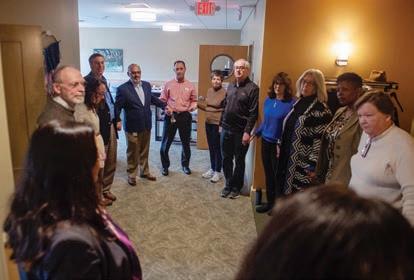 By David Rullo | Sta Writer
By David Rullo | Sta Writer
The 10.27 Healing Partnership announced plans to continue operations through 2028.
Created after the Oct. 27, 2018, massacre at the Tree of Life building, the organization made the announcement despite the imminent cessation of its funding, which is from a federal Antiterrorism Emergency Assistance program grant administered by the Pennsylvania Commission for Crime and Delinquency. Funding will end on Sept. 30.
The Partnership made the decision after a lengthy strategic planning process, which involved input from community stakeholders including family members of the 11 people murdered during the attack, survivors of the attack, constituents from the three congregations targeted, Jewish community organizations and survivor communities of other hate-based mass violence.

The Partnership is announcing its decision nearly six months before its funding ends to assure the community that it is committed to continue its services during the trial of the accused shooter and the commemoration ceremonies through 2028.
Maggie Feinstein, director of the Partnership, said the organization asked key questions in
— LOCAL —
By Justin Vellucci | Special to the ChronicleRichard Kann, a community leader who strongly influenced several other leaders of Jewish Pittsburgh today, has died. Kann — who served as the board chairman of the Jewish Federation of Greater Pittsburgh and was known for his love of biking, golfing and keeping active — died March 4 at home, two days after accepting hospice care due to kidney failure. He was 84.
Kann’s first wife, Anna L. Kann, died of breast cancer. He married Bobbi Zimmer Kann after they were set up by matchmaker Tova Weinberg.
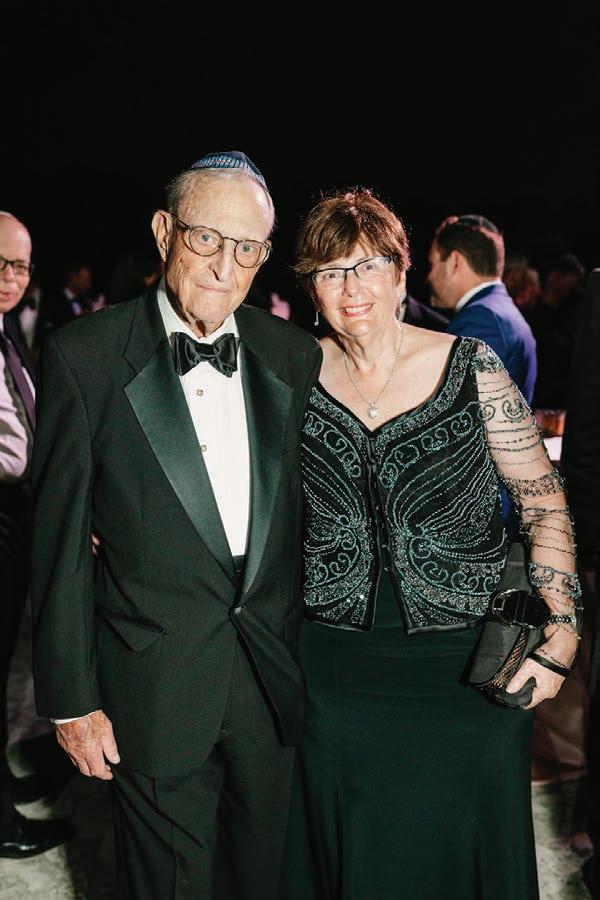
“On the second date, it was like something clicked,” Zimmer Kann remembered. “We had similar values, even though I was Orthodox and he was Reform. It all fell into place.”
“He was a great guy,” added Zimmer Kann, who was married to Richard for more than 14 years. “He taught me how to golf. We just had a really good time.”
Howard Rieger, a former president and CEO of the Federation, met Kann in his early days with the Pittsburgh organization in 1981. Their bond was a strong one; they shared a Shabbat dinner just three days before Rieger left for Israel in February.
“Over a period of 42 years, you get to know someone well,” Rieger said. “Richard Kann was someone who was always comfortable with who he was, where he came from and what he believed about a wide range of subjects. He didn’t harbor hidden agendas. You always knew where he was coming from.
“As someone so committed to supporting the Jewish community, and with a love for Israel and the Jewish people, his goal was always to do what needed to be done, rather than to seek honors for what he did — although he got
well-deserved recognition whether he sought it or not,” Rieger added.
Kann had two children with his first wife: Andrea Kann Gassner, who lives in New York City; and Daniel E. Kann, who lives in Ventura, California. He also was a stepfather, a brother and a “papa.” He is survived by extensive family and friends.
Blair Jacobson, a semi-retired financial services professional who lives in Oakland, remembered biking with Kann in what they joked was the OMBC – Old Man’s Bicycle Club. Most weekend trips exceeded 25 or 50 miles; they even went on a biking tour of Amsterdam.
“Richard was a good mechanic — he was always good at fixing flats and keeping the bikes
“He pushed himself and kept himself going,” he added. “But he listened to his body tell him what he should and shouldn’t be doing.”
Kann served the Rotary Club of Pittsburgh for more than 50 years; multiple Rotarians mourned his passing publicly.
“It is with great sympathy that we share our condolences over Dick’s passing,” said Linda Fischer Bruce, in a note posted to the Ralph Schugar Chapel website shortly after his death. “He was a great Rotarian, friend, mentor and advocate not only to members of the Rotary Club of Pittsburgh, but to many that he engaged with ... always leaving you feeling cared about and appreciated.”
Kann sat on the executive committees of the Pennsylvania Restaurant Association and the Jewish Healthcare Foundation. A longtime member of Rodef Shalom Congregation in Oakland, he also served on its executive committee.
“He was a wonderful member of our board for many years,” said Rabbi Aaron Bisno of Rodef Shalom. “He was a man of great capability — smart. Richard Kann had very strong opinions and often they were at odds with conventional thought. But Richard kept conversations going and did not cut off dialogue.”
“We’ll miss him,” Bisno added. “He was the best of us.”
Kann was a central, valued counselor to Jeff Finkelstein, president and CEO of the Jewish Federation of Greater Pittsburgh.
“A truly fearless fundraiser and stalwart supporter of Jewish Pittsburgh, Richard Kann chaired the Jewish Federation’s community campaign in 2000 and board in 2003,” Finkelstein said in a prepared statement. “When I became a first-time CEO in 2004, I was so lucky to have Richard as my first board chair to serve as my teacher in finance, business and so many facets of the job.”
“Our community has lost a dedicated, committed leader — someone who would not shy away from the difficult tasks of leadership,” Finkelstein added. “I have lost a friend and mentor.”
In addition to Kann’s work with the Federation, he was a lifelong member of the Westmoreland Country Club and the Concordia Club. He also served as an adviser to the Cincinnati campus of Hebrew Union College.
Foster Goldman, an attorney and former Pittsburgher who lives in Phoenix, golfed often with Kann. He remembers him smoking two or three cigars per round of golf. He used to joke that, when Kann died, family should spread his
Please see Kann, page 9
5915 Beacon St., 5th Floor Pittsburgh, PA 15217
Main phone number: 412-687-1000
Subscriptions: 410-902-2300, ext. 1
SUBSCRIPTIONS
subscriptions@pittsburghjewishchronicle. org
410-902-2300, ext. 1
TO ADVERTISE advertising@pittsburghjewishchronicle.org
724-713-8874
EDITORIAL DEPARTMENT
Email: newsdesk@pittsburghjewishchronicle.org
BOARD OF TRUSTEES
Evan H. Stein, Board Chair
Gayle R. Kraut, Secretary
Evan Indianer, Immediate Past Chair
Gail Childs, Dan Droz, Malke Steinfeld
Frank, Seth Glick, Tammy Hepps, Cátia Kossovsky, David Rush, Charles Saul
GENERAL COUNSEL
Stuart R. Kaplan, Esq.
Jim Busis, CEO and Publisher 412-228-4690 jbusis@pittsburghjewishchronicle.org
EDITORIAL
Toby Tabachnick, Editor 412-228-4577 ttabachnick@pittsburghjewishchronicle.org
Andy Gotlieb, Contributing Editor
Adam Reinherz, Staff Writer 412-687-1000 areinherz@pittsburghjewishchronicle.org
David Rullo, Staff Writer 412-687-1047 drullo@pittsburghjewishchronicle.org
ADVERTISING
Phil Durler, Senior Sales Associate 724-713-8874 pdurler@pittsburghjewishchronicle.org
PRODUCTION
Jeni Mann Tough Production Manager
Carl Weigel
Art/Production Coordinator Subscriptions subscriptions@pittsburghjewishchronicle.org 410-902-2300, ext. 1
Published every Friday by the Pittsburgh Jewish Publication and Education Foundation 5915 Beacon St., 5th Floor Pittsburgh, PA 15217 Phone: 412-687-1000


POSTMASTER:
Send address change to PITTSBURGH JEWISH CHRONICLE, 5915 BEACON ST., 5TH FLOOR PITTSBURGH, PA 15217 (PERIODICAL RATE POSTAGE PAID AT PITTSBURGH, PA AND AT ADDITIONAL MAILING OFFICES) USPS 582-740
Manuscripts, letters, documents and photographs sent to the Pittsburgh Jewish Chronicle become the property of this publication, which is not responsible for the return or loss of such items.
The Pittsburgh Jewish Chronicle does not endorse the goods or services advertised or covered in its pages and makes no representation to the kashrut of food products and services in said advertising or articles. The publisher is not liable for damages if, for any reason whatsoever, he fails to publish an advertisement or for any error in an advertisement. Acceptance of advertisers and of ad copy is subject to the publisher’s approval. The Pittsburgh Jewish Chronicle is not responsible if ads violate applicable laws and the advertiser will indemnify, hold harmless and defend the Pittsburgh Jewish Chronicle from all claims made by governmental agencies and consumers for any reason based on ads appearing in the PittsburghJewish Chronicle

The alternative, he said, would have been a homicide case in state court.
By David Rullo | Sta WriterFour-and-a-half years after the massacre at the Tree of Life building, jury selection for the alleged shooter’s trial is scheduled to begin on April 24.
And while the gears of justice are known to grind slowly, the long wait between the murder of 11 Jews celebrating Shabbat at three congregations — Congregation Dor Hadash, New Light Congregation and Tree of Life Congregation — has left many angry and confused. So has the estimated length of the trial: three months.
The defendant faces 63 criminal counts, including hate crimes.
Duquesne University law Professor Bruce Ledewitz said the trial is expected to last so long because this is a federal death penalty case.
Ledewitz teaches state and federal constitutional law and jurisprudence. He co-founded the Western Pennsylvania Coalition Against the Death Penalty and served from 19851990 as secretary of the National Coalition to Abolish the Death Penalty.


“This case illustrates perfectly one of the flaws in the death penalty that people do not understand,” he said. “It turns what would be an ordinary case into celebrity events. Everybody is being extremely careful. If there were no death penalty, the federal government wouldn’t have gone after this guy.”
“He would have been convicted a long time ago,” Ledewitz said.
The federal death penalty is a complicated system that federal prosecutors and judges have little experience with, Ledewitz said. He contrasted it to the state system where “they do homicide cases every day, and death penalty cases not infrequently.”
From 1988 — the year the federal death penalty was reinstated — to 2021, only 79 defendants have been sentenced to death, according to the Death Penalty Information Center. By comparison, from the time Pennsylvania enacted its death penalty statute in 1978, until 2015, the commonwealth sentenced 408 prisoners to death.

David Harris, the Sally Ann Semenko Endowed Chair and professor of law at the University of Pittsburgh, agrees that the three-month timetable for the trial is because it is a capital case.
“For a death penalty trial, there are certain procedures and a whole different way of running a trial than in a regular, non-capital case,” he said. Harris recently taught two community courses offered by the 10.27 Healing Partnership to help cut through the inherent confusion in the legal system.
The notoriety of the case presents challenges, Harris said, pointing to the need to select an impartial jury and the right of the defendant to a fair trial.
“We hold dear our values of every person getting due process,” Harris said, “whether

he deserves it or not. It’s a question of what we consider justice.”
Ledewitz said that it will be difficult to seat a jury, which is why 1,500 potential jurors began filling out questionnaires several weeks ago. Although Ledewitz has not seen the questionnaire, he expects many of the questions will eliminate some people quickly. Questions might include whether a potential juror’s spouse is a police officer, if they have ever been arrested or convicted of a crime, or if they know the prosecutor.
Harris said that it’s going to be a tall order to seat a jury.
“We need 12, and probably four alternates,” he said. “It will be tougher than usual to find 12 people that say, ‘I’ll follow the evidence wherever it goes. I haven’t made up my mind about whether there is reasonable doubt, and I’m going to be fair. I’m going to follow the judge’s instructions and listen to the evidence.’”
Adding to the difficulty, Harris said, will be identifying people who are open to sentencing someone to death.
A death penalty case, he explained, is broken down into at least two separate phases; the Pittsburgh synagogue shooting case will include three separate phases.
The first part, Harris said, is where guilt or innocence is decided. If the defendant is found guilty, the next part, to be decided by the same judge and jury, would determine whether there were “aggravating factors” that would qualify the defendant for the possibility of the
death penalty.
Ledewitz said numerous aggravating factors determine if a defendant is eligible for a death sentence.
For example, he said, the prosecution could show there was a death during the commission of another crime; that there was a previous conviction of a violent felony; that there was a previous conviction of an offense for which a sentence of death is authorized; grave risk of death to additional persons; a heinous, cruel or depraved manner in committing the offense; substantial planning and premeditation; or the vulnerability of the victim.
If the jury decides the defendant is eligible for the death penalty, a third phase will take place where the prosecution will offer victim impact statements and the defense will offer factors that might mitigate the death penalty.
Harris said that examples of mitigating factors in a death penalty case could include impaired mental capacity, evidence of an abusive childhood or duress.
No matter how one feels about the death penalty, Ledewitz said, the time it’s taken for the trial to begin is problematic.
“This is justice denied,” he said. “Not only is justice denied — because justice delayed is justice denied — but people have had to live with this all these years when it should have been over years ago.” PJC
David Rullo can be reached at drullo@ pittsburghjewishchronicle.org.
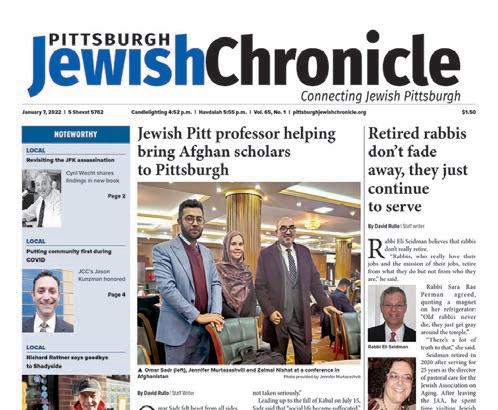
“We hold dear our values of every person getting due process....
It’s a question of what we considerp David Harris Photo courtesy of the University of Pittsburgh School of Law
“This case illustrates perfectly one of the flaws in the death penalty that people do not understand.”


Afunny thing happens when Jewish reporters interview Ira Glass. They often “bagel” him.
For Glass, host of NPR’s “This American Life,” being peppered with questions about his Jewish upbringing, Hebrew school atten dance and visits to Israel is familiar. In fact, he told the Chronicle (when this reporter fell into the same trap of identifying refer ences to Judaism on Glass’ award-winning program) that despite being an atheist, he doesn’t mind the Jewish focus at all.
“I did a show in Queens last weekend, and any mention I made of Queens got an insane response,” he said. “It’s like that, like playing to a local crowd. I’m good with it.”
Since 1995, Glass’ recognizably nasal cadences have delighted millions of listeners. Each week, he and his colleagues at “This American Life” tell uplifting, enthralling and somber stories about everyday people. The tales, which comprise an hour-long program, are heard on 500 stations nation wide. But well before “This American Life” became one of the nation’s most down loaded podcasts, or won the 2020 Pulitzer Prize for audio reporting, Glass, 64, was just a kid from Baltimore growing up in a Conservative Jewish household.
“My parents, neither of them went to Hebrew school or were raised in very religious homes,” he said. “They moved to the suburbs, and they just thought this would be a thing to do for our kids and gave us the Jewish education that they never had.”
Attending Hebrew school led to taking on Jewish rituals at home.
“Each of my sisters and I went through a phase in going to Hebrew school where we felt like, ‘Oh, this makes a lot of sense.’ We would come home and be like, ‘Why aren’t we lighting candles on Friday night?’ And each of us kind of enforced that for like a
period, a year or two, and then we would drop it, and then the next kid would age into it and do that for a year or two and then drop it.”
Glass was a regular synagogue-goer through his teenage years. He said he’s basically stopped attending services but whenever he is in shul something strange occurs: “I still know all the words to all the prayers.”
He’s not a fan of some of the changes, though.
“I find it really annoying that Jews feel
obliged to change the tunes for ‘Adon Olam’ and ‘Ein Keloheinu,’ and all the other songs that I knew as a child,” he said with a laugh. “It’s like going to the concert of a band, and I know all their songs, but they refuse to play them with the original melody.”
Glass called synagogue attendance “deeply nostalgic and utterly frustrating,” but said there’s a principal reason he doesn’t go: He doesn’t believe in God.
“I don’t think that synagogue is there for people to feel nostalgic,” he said. “It’s for people to worship God and have community, so shul is not a place for me at all. I know enough about Judaism to know many Jews would contest that and say it doesn’t matter whether you believe in God — all that matters is that you follow the commandments and kind of be part of the community — but the not believing in God part kind of takes the wind out of the sails for me.”
Jewish scholars and historians have long analyzed, debated and defined the distance between faith and identity. Glass offered his own take.
“I identify as a Jew in the same way as I identify with somebody who’s from Baltimore — like I have no choice,” he said. “It’s like what the writer Richard Rodriguez said: ‘Your cultural identity isn’t a suitcase you can lose at the airport.’ Like, I simply am a Jew. So I guess I identify as a Jew, but — I don’t know — I don’t think it’s the most important thing about me or close to it.”
Glass described what he finds important, but only after answering questions about visiting Israel, about his knowledge of Hebrew and about the horrifyingly singular
time his grandmother met Adolf Hitler.
“My own life isn’t particularly that interesting,” Glass said. “I don’t have a lot of notable fascinating things happening to me. Things are pretty stable. I’m a person with a pretty secure job that I’ve been doing for years and years and years.”
But that’s part of the important thing Glass wants people to know. For nearly 30 years, he and his colleagues have created more than 700 episodes of “This American Life.” Since its inception, the program has grown richer thanks to the diversity and expertise of a staff who “push things in weird, different directions that I wouldn’t think of,” he said.
Glass, a self-described “frontman,” will describe the collaborative process and share fun stories about “This American Life” during his March 25 talk at the Byham Theater. Titled “An Evening with Ira Glass: Seven Things I’ve Learned,” the program is intended to entertain attendees who’ve never heard an episode and those who relish his pregnant pauses.
He said he’d love for people to come to the show before humorously noting that it will be “nothing” like the conversation he just had with the Chronicle.
Glass added that if readers are looking for a takeaway, it’s similar to when the Beatles arrived in the United States and were asked if they had a message to share: “One of them said, ‘Yes. Buy more Beatles’ albums.’” PJC
Adam Reinherz can be reached at areinherz@pittsburghjewishchronicle.org.
“I don’t think that synagogue is there for people to feel nostalgic. It’s for people to worship God and have community, so shul is not a place for me at all.”
–IRA GLASSp Ira Glass Photo by sandrasonik.com p Ira Glass Photo by Sandy Honig
Aseries of programs is enabling young Jewish women and gender nonconforming individuals to take hold of their finances.
The seminars and workshops, which focus on credit, budgeting, building an emergency fund, understanding debt and investing, are thanks to a partnership between Hillel JUC, Jewish Women’s Foundation of Greater Pittsburgh and Jewish Women’s International.
“This is an opportunity for us to tie in Jewish values and financial literacy while providing these women with insights, structures and resources in a safe space,” Hillel JUC’s Assistant Director Kari Exler said. “We want to open the door to these types of conversations and create opportunities for Jewish women to come together and build each other up.”
Judy Greenwald Cohen, executive director of the Jewish Women’s Foundation, said the pilot program is “more than just understanding how to balance a checkbook and what it means to have a credit card. It really is about empowering [the students] for their long-term financial security.”
Cohen pointed to a recent report about equal pay from the Labor Department.
As of March 14, women face “systemic inequality,” according to the government. Women who work full time, year-round, within the U.S., are paid only 83.7% as much as men. The loss of nearly 16 cents on the dollar results in a difference of $10,000 annually. Women of color, and women with disabilities, experience even greater pay disparities.

Cohen said the statistic is alarming, as is the common occurrence of women knowing less about their finances than men.
“We can’t let this happen to women in our community,” she said. “We just have to put a stop to it. And this is one way we can start to make a difference.”
Exler said the programming will serve about 75 students, occur at Hillel JUC and benefit from resources and support from JWF and JWI.
JWF is providing a $15,000 grant and JWI is administering the in-person workshops and long-term support, according to Cohen.
For years, JWI has provided education, advocacy and training for at-risk women and girls, the organization’s officials said.
Cohen called the group’s longstanding work with domestic abuse survivors a critical reminder of the realities faced. Abuse doesn’t only involve physical harm within relationships, she said. There’s also a financial component.
The 2021 National Needs Assessment of Domestic Abuse in the Jewish Community found that 98% of survivors of domestic
abuse reported a “lack of financial resources as their top barrier to escaping violence,” according to JWI.
“When a woman controls her money, she controls her future,” JWI’s CEO Meredith Jacobs said.
The financial literacy programming is consistent with Hillel JUC’s commitment to preparing students for post-college life, Exler said. Adulthood requires serious decisions about finances and lifestyle, and finding a place within the Jewish community is a part of those considerations.
Aviva Lubowsky, former director of marketing and development at the Hebrew Free Loan Association of Pittsburgh, identified those challenges last year.
A family of four, with two day school-aged children seeking active participation in local Jewish life, can expect to spend $44,000 annually on related expenses, she wrote in a 2022 piece for the Chronicle. With the area median gross income for a family of four at $84,800, hundreds of local Jewish families “need to reckon with forking over somewhere around half their income for participating in religious life and a Jewish education for their children.”
The challenge becomes even greater when considering findings from the 2017 Greater Pittsburgh Jewish Community Study, Lubowsky continued. Based on that report, 37% of households indicated “their income was less than $50,000 a year,” and “one in 10 young adults (ages 18-34) in our community say they are nearly poor or poor.”

Exler said that financial literacy training — like teaching students how to organize, cook and host a Shabbat meal — represents Hillel JUC’s desire to prepare students for leaving the cocoon of Jewish life on campus. For graduates who wish to “continue their Jewish journey,” she said, finding a place for Friday night dinner isn’t the only thing that requires planning. PJC
Adam Reinherz can be reached at areinherz@pittsburghjewishchronicle.org.
Submit calendar items on the Chronicle’s website, pittsburghjewishchronicle.org. Submissions also will be included in print. Events will run in the print edition beginning one month prior to the date as space allows. The deadline for submissions is Friday, noon.
FRIDAY, MARCH 24
Join the National Council of Jewish Women for MomsWork Career Day, a free career afternoon with child care, Career Development Center workshops, professional headshots, resume review, mock interviews and more. This is a PPS half day, so pick up your kids and come spend the day with us. Optional paid lunch options for adults and kids. 1 p.m. 1620 Murray Ave. ncjwpghevents.org/ upcoming-events.
Join Temple Sinai for a special Shabbat dinner to begin a celebration in honor of the installation of Rabbi Daniel Fellman and Cantor David Reinwald. Kosher menu. $28 per adult. 5:30 p.m. Details at templesinaipgh.org.
Join Temple Sinai for the installation of Rabbi Daniel Fellman and Cantor David Reinwald Rabbi Fellman will be installed by Rabbi Bennett Miller and Cantor Reinwald by Cantor David Serkin-Poole. 7 p.m. templesinaipgh.org.
SATURDAY, MARCH 25
Be Temple Sinai’s guest for Havdalah and Celebration Concert: Ha’tov v’Ha’meitiv— A Gathering of Goodness in Harmony, a celebratory concert directed by and featuring Cantor David Reinwald, clergy from our community and other special guests. 7:30 p.m. templesinaipgh.org.
SUNDAY, MARCH 26
Join Beth Shalom for a champagne brunch as they honor volunteers and introduce the Daniel M. Plaut Youth Service Award. 10 a.m. $36/per person. Registration required at BethShalomPgh.org/ volunteerawards2023.
The Jewish Genealogy Society of Pittsburgh presents “Once More Under the Clock: Remembering Kaufmann’s.” Marylynne Pitz, Laura Malt Schneiderman and Melanie Linn Gutowski will o er insights into Kaufmann’s Department Store and the Kaufmann family. They’ll also share some of their favorite discoveries from the vast collection of Kaufmann’s Department Store materials at the Rauh Jewish Archives at the Heinz History Center. 11 a.m. Heinz History Center, 1212 Smallman St. heinzhistorycenter.org/event/once-more-under-theclock-remembering-kaufmanns.
In honor of Rabbi Daniel Fellman and Cantor David Reinwald’s installation, Temple Sinai presents a community tikkun olam program on food insecurity. Volunteers will help pack bagged lunches for Light of Life Rescue Mission. 11 a.m. Lunch is included. templesinaipgh.org.
Join Rabbi Barbara Symons and local contributors for the book launch of “Prophetic Voices: Renewing and Reimagining Haftarah.” Symons will discuss how the book came to be and give examples of essays, interpretations and alternative texts that call us to take next steps in the realms of spirituality, self-care and concern for others, and social justice. Discounted books will be for sale. 1 p.m. Temple David, 4415 Northern Pike. templedavid.org.
SUNDAYS, MARCH 26 – APRIL 30
Join a lay-led online Parashah study group to discuss the week’s Torah portion. No Hebrew knowledge needed. The goal is to build community while deepening understanding of the text. 8:30 p.m. For more information, visit bethshalompgh.org.
SUNDAYS, MARCH 26 – DEC. 4
Join Chabad of Squirrel Hill for its Men’s Tefillin Club. Enjoy bagels, lox and tefillin on the first Sunday of the month. 8:30 a.m. chabadpgh.com.
MONDAYS, MARCH 27 – MAY 1
Join Congregation Beth Shalom for a weekly Talmud study. 9:15 a.m. For more information, visit bethshalompgh.org.
MONDAY, MARCH 27 – SUNDAY, MAY 7
The Healing Garden is an exhibit of drawings by members of the Allegheny Highlands Botanical Art Society. Free and open to the public. Opening reception on Monday, March 27, at 6 p.m. Rodef Shalom Congregation, 4905 Fifth Ave. rodefshalom.org.
MONDAY, MARCH 27
Join Chabad of the South Hills for a pre-Passover ladies night out and explore how the Exodus from Egypt is relevant today while tasting international Passover dishes. 7:30 p.m. 1701 McFarland Drive. chabadsh.com.
MONDAYS, MARCH 27 – MAY 15
Understanding the Torah and what it asks of us is one of the most important things a Jew can learn. But most Torah classes begin in Genesis and never finish the first book. If you want a comprehensive overview of the whole Torah, Torah 1 is the course for you. In the first year of this two-year Zoom course, Rabbi Danny Schi will teach Genesis, Exodus and the first half of Leviticus. In the second year, he will complete Leviticus and cover Numbers and Deuteronomy. $225. 9:30 a.m. foundation.jewishpgh.org/torah-1.
TUESDAY, MARCH 28
The Tree of Life Congregation presents Art as Midrash with Rabbi Je rey Myers. Examine the artistic renderings of the Four Sons to see the impact of this part of the Haggadah. 8 p.m. Online. treeoflifepgh.org/event/ArtAsMidrash.
Join Rodef Shalom Congregation Librarian Sam Siskind for wine, cheese and a discussion of the novel “How to Find Your Way in the Dark,” winner of the 2022 Association of Jewish Libraries Jewish Fiction. 6:30 p.m. 4905 Fifth Ave. rodefshalom.org.
TUESDAYS, MARCH 28 – APRIL 25
Join Temple Sinai for a weekly Talmud class with Rabbi Daniel Fellman. Noon. On site and online. For more information and for the Zoom link, contact Temple Sinai at 412-421-9715.
TUESDAYS, MARCH 28 – MAY 9
In “Israel Literature as a Window to Israel Society,” Rabbi Danny Schi will facilitate an encounter with Israeli society through the pens of Israel’s leading writers, discovering voices that are original, contemporary and honest. This 10part Melton course takes you on a literary journey o ering a fresh examination of the ever-relevant issues faced by Israeli writers. Together, learners will read poetry and prose that is challenging and self-critical, gaining insights into the Jewish national psyche. 9:30 a.m. $160. jewishpgh.org/event/israeliliterature-as-a-window-to-israeli-society/2023-02-07.
TUESDAYS, MARCH 28 – DEC. 26
Led by a certified yoga teacher, yoga class at Temple Sinai is welcome to all levels. No experience necessary. 16 and older. $15. Register at templesinaipgh.org.
WEDNESDAY, MARCH 29
The confidential Infertility Support Group is open to all people in the Pittsburgh area struggling with infertility. The free Zoom group is facilitated by a licensed therapist who specializes in this area. Groups meet monthly. 7 p.m. jewishfertilityfoundation.org/support.
WEDNESDAYS, MARCH 29 – APRIL 19
Participate in weekly gentle yoga with a skilled and caring yoga instructor experienced in traumainformed care. Experience an hour of gentle and calming yoga and learn yoga you can do at home and in stressful situations, including while seated. 3 p.m. 10.27 Healing Partnership suite inside the Squirrel Hill JCC. Facilitated by Susie Balcom and open to everyone. Register here: forms.gle/ JQtgrutJyByaMM5K6.
WEDNESDAYS, MARCH 29 – MAY 24
In the new 10-part Zoom course, “Sacks: To Heal a Fractured World,” Rabbi Danny Schi will explore “To Heal a Fractured World,” Rabbi Jonathan Sacks’ book on the nature of Jewish responsibility for the broader world. Students will be invited to read this pivotal book and to discuss its contents in order to arrive at a better understanding of the views of Rabbi Sacks on the goals and vision of Judaism. 9:30 a.m. $145 for all 10 sessions. jewishpgh.org/event/sacks-to-heal-a-fracturedworld/2023-02-2.
Registration is now open for “Melton Core 1: Rhythms and Purposes of Jewish Living.” This 25-lesson course will take you through the year’s cycle — the life cycle traditions and practices that bind us together. Explore not just the what is and how is of Jewish living, but the why is that go with them. 7 p.m. $300 per person, per year (25 sessions), includes all books and materials. Virtual. foundation.jewishpgh.org/ melton-core-1.
WEDNESDAYS, MARCH 29 – DEC. 27
Bring the parashah alive and make it personally relevant and meaningful with Rabbi Mark Goodman in this weekly Parashah Discussion: Life & Text. 12:15 p.m. For more information, visit bethshalompgh.org/life-text.
Temple Sinai’s Rabbi Daniel Fellman presents a weekly Parshat/Torah portion class on site and online. Call 412-421-9715 for more information and the Zoom link.
THURSDAYS, MARCH 30 – APRIL 27
Many are concerned that democracy is under threat. That reality raises a critical question: What does Judaism have to say about democracy? What is the attitude of Judaism to majority rule, to defending minorities, to the separation of religion and state, to kings and courts? In “Is Judaism Compatible with Democracy?” Rabbi Danny Schi will delve into what our texts have to say about the structure of government from a Jewish viewpoint. Co-sponsored and o ered in conjunction with Temple Sinai. $55. 9:30 a.m. Temple Sinai, 5505 Forbes Ave. jewishpgh.org/event/is-judaism-compatible-withdemocracy/2023-03-23.
SUNDAY, APRIL 2
What happens if you mix corn starch and water? How do volcanoes work? Can you make fireworks in a jar? Tot Science Night at Temple Sinai is dedicated to your curious, questioning kids with experiments for all ages. Come prepared to get messy. Questions? Contact Danie Oberman, community engagement director, at Danie@TempleSinaiPGH.org or 412-421-9715, ext. 121.
MONDAY, APRIL 3
Music at Rodef Shalom presents arias and duets from the world of grand opera featuring Walter Morales (piano and host), Kelly Lynch (soprano) and Raymond Blackwell (baritone). Music by Debussy, Ravel, Verdi, Puccini and selections from the Great American Songbook. 7 p.m. 4905 Fifth Ave. rodefshalom.org.
WEDNESDAY, APRIL 5
Chabad of Squirrel Hill presents a first night of Passover Community Seder. Enjoy a gourmet Passover meal in the company of family and friends. $25/adult, $15/child. 7:30 p.m. 1700 Beechwood Blvd. chabadpgh.com.
Enjoy a first night elegant and delicious Community Passover Seder filled with insight, meaning and inspiration at Chabad of the South Hills. 7:30 p.m. $65 adult/$25 children. chabadsh.com.
THURSDAYS, APRIL 6; MAY 4; JUNE 1
Join local clergy from Jewish and Christian backgrounds for the Christian Jewish Dialogue, a monthly discussion exploring topics of similarities and di erences. Noon. Rodef Shalom Congregation. rodefshalom.org.
SUNDAYS, APRIL 9–30
The ten plagues. The Exodus. The splitting of the sea. The delivery of manna … Judaism has a long list of miracles. But do we really believe in miracles? How should rational minds think about the miraculous? In “Miracles - A Jewish Perspective,” Rabbi Danny Schi will consider the place of miracles in Judaism and how Jews might think about the miraculous today. 10 a.m. $55. Four sessions on Zoom. jewishpgh.org/event/miracles-ajewish-perspective.
MONDAYS, APRIL 10–MAY 22
We Jews have an array of texts and making sense of them is not easy. In the six-part series “The Jewish Text Puzzle,” Rabbi Danny Schi will put the pieces of the “text puzzle” into one coherent picture, so that the place of Torah, Tanakh, Talmud, Midrash, Responsa and Kabbalah, as well as many other sources, can be easily understood. Schi will provide a historical context that will explain the significance of our various texts to Judaism. 7 p.m. $85. Rodef Shalom Congregation, 4905 Fifth Ave. jewishpgh.org/event/thejewish-text-puzzle.
THURSDAYS, APRIL 13, 27
This bimonthly Refaeinu healing circle is led by Sara Stock Mayo, a spiritual leader, trained drama therapist, musician and poet. The space will be open to anyone who seeks to create community in shared healing rituals, Jewish texts and music, art making and embodied wellness practices. 10.27 Healing Partnership Suite, JCC of Greater Pittsburgh. 7 p.m. To register, visit forms.gle/ pAJoXvNXSJ9Ks3ow9.
SUNDAY, APRIL 16
“When Henry Silverstein Got Cold. How Terrible Enumerators Help Us Do Better Census Research with Tammy Hepps” is a collaboration between the Jewish Genealogy Society of Pittsburgh and the Rauh Jewish Archives at the Heinz History Center. Register online. The program is free for JGS-Pittsburgh members as well as for the general public. 11 a.m. Heinz History Center, 1212 Smallman St. heinzhistorycenter.org/event/ jgs-pittsburgh-presents-when-henry-silversteingot-cold.
Scholar and activist Dr. Shula Mola, named one of Israel’s 50 most influential women in 2022 by Globes newspaper, will deliver the annual lecture of the Israel Heritage Nationality Room and the University of Pittsburgh’s Jewish studies program. The title of her talk is “Becoming Visible: Ethiopian Jews and the Formation of Black Identity” in Israel. 4:30 p.m. Free. Cathedral of Learning, room 332.
MONDAY, APRIL 17
Women are invited to attend Chabad of Squirrel Hill’s Torah and Tea and explore the rich stories of our matriarchs with Rivky Herman. 7 p.m. $18. 1700 Beechwood Blvd. chabadpgh.com.
WEDNESDAY, APRIL 19
Join the Squirrel Hill AARP for its April meeting State Sen. Jay Costa will be the guest speaker and will discuss what is going on in Harrisburg and senior citizen issues. 1 p.m. Rodef Shalom Congregation, Falk Library. For further information contact Marcia Kramer at 412-656-5803.
WEDNESDAYS, APRIL 19 – DEC.20
Join AgeWell for an intergenerational family dynamics discussion group, geared toward anyone who has children, grandchildren, a spouse, siblings or parents. Family dynamics is a fascinating topic and whether you have family harmony or strife, these discussions are going to be thoughtprovoking and helpful. Led by intergenerational specialist/presenter and educator Audree Schall. Third Wednesday of each month. Free. 12:30 p.m. South Hills JCC.
Please see Calendar, page 7
The Center for Media Innovation at Point Park University will host a screening of the documentary film “Repairing the World: Stories from the Tree of Life” on Monday, March 27, from 5:30 to 8 p.m. Filmmaker Patrice O’Neill, leader of Not in Our Town, which has produced films on community responses to hate, will be present at the event.
said Andrew Conte, director of the Center for Media Innovation. “As Pittsburgh news outlets prepare to cover the trial, it’s important for all of us to remember and celebrate the resilience of the city and our region.”
Maggie Feinstein, director of the 10.27 Healing Partnership, a cosponsor of the event, said her organization is thrilled to welcome O’Neill and the Not In Our Town film back to Pittsburgh.
“This film has so much to teach people about the terrible impact of modern antisemitism
COME SEE THE LARGEST SELECTION OF PASSOVER FOODS IN PITTSBURGH WE HAVE A FULL SELECTION FOR ALL YOUR PASSOVER NEEDS! WINE
The screening, which is free and open to the public, will be held in the George Rowland White Theatre in the University Center, 414 Wood St.
“Pittsburgh has provided a model for what people can do to combat antisemitism and hate,” O’Neill said. “As we watched the events unfold in Pittsburgh, what we found is a community that cared deeply for one another. We saw a diverse cross-section of the community standing together in the face of horrific violence.”
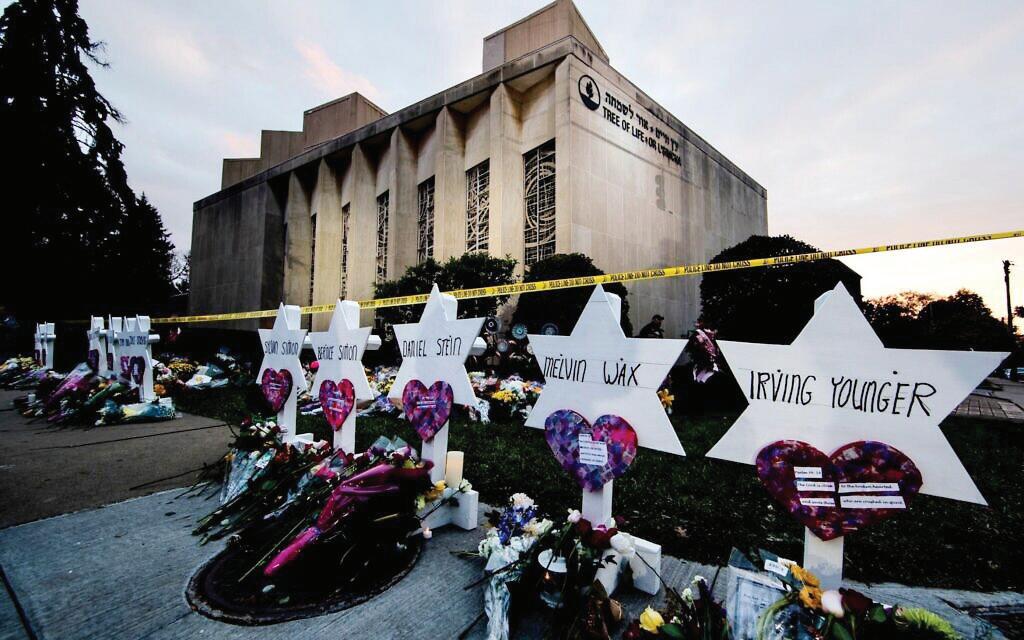
The screening will include a discussion with O’Neill and other special guests.
The trial of the accused shooter is scheduled to begin April 24.
“We are honored to work with Patrice and our cosponsors to bring this screening to campus,”
Calendar:

Continued from page 6
THURSDAYS, APRIL 20, MAY 18
Join the JCC Bu alo for monthly virtual readings as part of the Jewish Poetry Series. Hosted by Philip Terman and Baruch November. Each month will feature di erent Jewish poets reading selections of poems that include but are not limited to Jewish themes, values and ideas. 7 p.m. Free and open to the community. jccbu alo.org/events/2023/02/09/ arts-and-culture/virtual-jewish-poetry-reading-series.
FRIDAY, APRIL 21
Do your kids like to sing and dance? Do you want them to get the Shabbat feeling? Are you looking for an informal, inviting way to teach your little ones about Shabbat and connect with other families? Join Temple Sinai for Tot Shabbat beginning at 5 p.m. with snacks, schmooze and fun. Service starts at 5:30 p.m. A complimentary and kid-friendly dinner will follow at 6 p.m. templesinaipgh.org.
SUNDAY, APRIL 23
Jewish Veg welcomes Rabbi Akiva Gersh, aka The Vegan Rabbi, from Israel to Pittsburgh. A graduate
in the United States, but also what solidarity and allyship looks like,” she said. “And Patrice has been a great ally who brings out some of our community’s best voices.”
The message of how Pittsburgh has dealt with the attack is more important than ever, as antisemitic hate speech and violence continues in the years since the attack, O’Neill said.
“It’s about the whole community and the process of working together in the aftermath of the attack, and what people do to stop the spread of antisemitism and hate,” she said. “Pittsburgh continues to live and breathe the motto that was coined then — we are stronger than hate.” PJC
Toby Tabachnickof Brown and Yeshiva universities, Rabbi Gersh will show how our sacred texts and rabbinic tradition lead us to a plant-based diet. Kosher vegan hors d’oeuvres will be served. Free. 3 p.m. Boyce Park, Patrol Shelter, Plum Borough. jewishveg. org/Pittsburgh.
Join Rodef Shalom Congregation for “Understanding Gen Z: How will the next generation shape our Jewish world?”, the 2023 Ruth and Bernard Levaur Contemporary Lecture with guest speaker Rabbi Debbie Pine, campus support director at Hillel International. This event is free and open to the public. Seating is limited and reservations are encouraged. Reception to follow.
7:30 p.m. 4905 Fifth Ave. rodefshalom.org/levaur.
SUNDAY, APRIL 30
On your mark. Get set. Go! Israel is celebrating 75 years of statehood this April. Pittsburgh will celebrate with a community “Yom Ha’atzmaut: Run/Walk/Roll for Israel at 75.” Free for nonracers. Craft tables, bounce house, Israeli line dancing, photo booth. Register to run/walk/roll and receive a race kit. 9:30 a.m. $12 per person/$5 for kids. Schenley Oval, 1 Overlook Drive. jewishpgh.org/ event/run-walk-roll-for-israel-at-75. PJC
— LOCAL —
By David Rullo | Sta WriterAfew Conservative rabbis across the U.S. are no longer reciting the Prayer for the State of Israel during services in protest of the Israeli government and some of its policies, according to the Jewish News Syndicate.
Rabbi Jeremy Kalmanofsky of New York City’s Congregation Ansche Chesed said he was discontinuing the prayer during Shabbat services because he believes Israel’s leaders are “dastardly.”
In a statement on the congregation’s website, Kalmanofsky wrote that he was replacing the prayer with “Psalm 122: Pray for the Peace of Jerusalem.”
While they understand the sentiment, Pittsburgh rabbis are keeping the prayer as part of their Shabbat services.
“When things don’t go our way, we have to pray even harder because we want to make sure that the principles of democracy are maintained,” said Rabbi Seth Adelson of the Conservative Congregation Beth Shalom. “We want to make sure that the government continues to hear our voices. We want to make sure that we see ourselves reflected
in the values of the Israeli government as well as that of our own.”

Withholding prayers for the government when one is displeased by it — whether in Israel or the United States — is exactly the wrong thing to do, he said.
are better ways than removing the Prayer for the State of Israel from services.
For Lehrer, addition makes more sense than subtraction.
“If you want to add a prayer, if you want to say something like the Mi Shebeirach or pray for
of the Reconstructionist Dor Hadash, was ordained as a Conservative rabbi the same year as Kalmanofsky. Dor Hadash, she said, doesn’t recite the Prayer for the State of Israel each Shabbat; rather, it allows whoever is serving as prayer leader to choose a prayer for the community.
The founder of Reconstructionism, Rabbi Mordecai Kaplan, wrote about Zionism in the 1950s, Bardack said.
“I’m praying that the state of Israel will survive this government and crisis in Israeli society; therefore, I recite the Prayer for Israel,” Adelson said. “I’m praying for its continuity and its adherence to the principles under which it was established as I am [praying] to help this government find the right path.”
“If anything,” Adat Shalom Rabbi Yaier Lehrer said, “Israel needs our prayers now more than ever.”
The survival of Israel, he said, is dependent, at least in part, on our prayers.
“You don’t take away your Prayer for the State of Israel,” he said.
At least half the Israeli population, Lehrer noted, agrees with the policies of its government. If some want to protest, he said, there
the protesters, I think that might be even more constructive, rather than the destructive way of eliminating the prayer altogether,” he said.
Rabbi Alex Greenbaum of Beth El Congregation of the South Hills stressed that “we don’t pray for [Israel’s] leaders; we pray for its leaders to do the right thing.”
Israel, the Conservative rabbi said, needs more prayers now than ever before.
Rather than eliminate prayers, Greenbaum said his congregation is welcoming speakers to help educate its members about what is happening in the Jewish state.
“At the same time, we’re not giving up our hope for Israel,” he said. “We still hope and pray that Israel remains a safe place for all.”
Rabbi Amy Bardack, the spiritual leader
“He already foresaw that it could be a challenge — Israel becoming a theocracy,” she said. “He believed in maintaining Israel’s democratic core that it stated in its Declaration of Independence, guaranteeing the rights of every resident governed by Israel.”
Bardack said she thinks that praying for any state raises theological questions.
“Do we believe that God can intervene in the policies of the government?” she asked. “Do we believe God can affect a military outcome? I don’t believe in a God who controls that level of human activity. So why would I pray to a God to ensure the success of any state?
“I’m not in favor of praying for a nationstate because I don’t think God is responsible for their decisions and actions,” she continued. “I think people are responsible.” PJC
David Rullo can be reached at drullo@ pittsburghjewishchronicle.org.
“Israel needs our prayers now more than ever.”
–RABBI YAIER LEHRER
Hausman said.
Continued from page 1
Among the piles inside Tree of Life’s social hall were items that will soon return to the earth. Discarded pairs of tefillin, old prayer books and printed copies of the Bible, “anything of a holy nature,” will get boxed and buried, as is Jewish custom, Rabbi Myers said.

For several people who entered the building, the day was a transitional point in Tree of Life’s history.
The congregation was chartered in 1865, according to the Rauh Jewish Archives. It was housed first in downtown Pittsburgh, then Oakland, and moved to Squirrel Hill in 1946. For nearly 72 years, generations worshipped, learned and socialized inside the building on Shady and Wilkins avenues.
“I remember it from being a child,” Diane Heller Klein said. “I was bat mitzvahed here. I was confirmed here. I went to Sunday school and Hebrew school here. My mother was president of the Sisterhood five times. My grandmother was president of the Sisterhood five times. My grandma and grandpa were both life trustees. I mean, our family roots are really deep.”
Klein learned about the building’s opening a day earlier from her sister, who lives in Florida and happened to see the Facebook post.
Sunday morning Klein drove 40 minutes from her home in Plum Borough to Squirrel Hill. She was looking for a picture of her greatgrandfather, Abraham A. Goldstein, the man whom Tree of Life named its Hebrew school after.
According to a family history, written by Klein’s grandmother Mildred Gould Reichman, Goldstein came to Pittsburgh to teach at Tree of Life in 1884, shortly after the congregation bought a building on the corner of Fourth Avenue and Ross Street in downtown Pittsburgh. He and his wife, Anna, lived in the building, where she gave birth to five children, including Reichman.
Goldstein was revered. After he died in 1938, Tree of Life’s Rabbi Herman Hailperin memorialized him by writing, “We often say that a man creates his own position in life. This is so true of the late Abraham A. Goldstein, sexton and Hebrew teacher of the Tree of Life for more than fifty years…. No rabbi was ever respected by his congregation any more than was the late Mr. Goldstein. He demands the request because of his learning, his sincerity, and his life-long
various elements of the Pittsburgh community.
devotion to the Tree of Life congregation.”
Klein knew there was a photo of her great-grandfather inside the building. She scoured the social hall but couldn’t find it. She asked Myers if he had any idea where she could find it.
“He knew exactly where it was,” Klein said. She held the framed photograph and adjacent proclamation heralding her great-grandfather’s half-century of service to Tree of Life. Then she began to cry.
After Oct. 27, 2018, “I had been back on the outside, to just pay respects, but this was the first time I’ve been inside,” Klein said. “And it’s difficult because I remember it. So it’s just been kind of an emotional thing walking through here and going, ‘Oh God, oh my God, I can’t believe what happened here, that son of a bitch,’ and just really unkind
authentically hold the space between study and gathering that meets their needs.”
words and thoughts towards that gentleman.”
Linda Schugar leafed through photographs on a table inside the social hall. She pointed to pictures of fellow minyan-goers, some who died during the massacre, some who died in the years since.
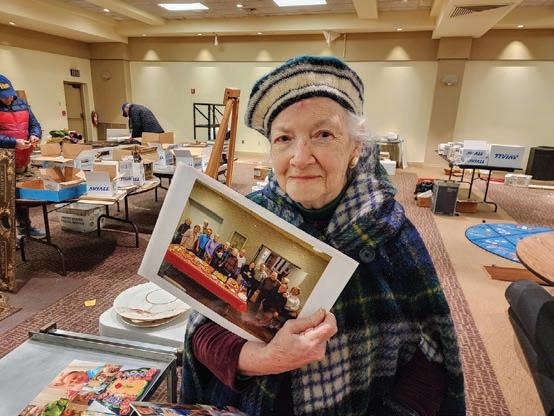
Next to the stacks of photos were plates, bowls and cups.
“I remember all the dishes,” she said. “We used these for daily minyans.”
Schugar returned to the photos, found several of her with former congregants and placed the images inside a large, black plastic bag.
“We loved what we did,” she said.
As individuals searched the piles for tangible reminders of family, friends and congregational life, Hausman continued boxing materials.
Continued from page 1
deciding whether to remain operational.
“One of the questions was, do we grow and stay open indefinitely, do we say that we are not going to be around forever but that this is the wrong time to close, or do we sunset with the grant,” Feinstein said.
The answer, Feinstein said, was that there should be a lifespan for the resiliency center, but now is not the right time to close.
Part of the organization’s focus over the next five years, she said, will be ensuring that, as the community comes out of the trial process — which is set to begin on April 24 and expected to take three months — the center has provided meaningful benefits so that its partners feel more equipped to manage trauma, serve and understand the victims of the event, understand victim services through a community lens and understand how a healing-centered community can look.
Since 2019, the 10.27 Healing Partnership has offered services and programs including individual counseling, Wellness Wednesdays, trauma-influenced yoga, drum circles, forest bathing and opportunities for connection and reflection for individuals impacted by the Oct. 27 attack and others who experience hate-induced trauma.
The Partnership also coordinates the annual commemoration that brings together
Kann:
Continued from page 2
ashes on the golf course, as he had spread ashes there for years.
“It’s been many decades — we had been
Feinstein acknowledged that the grief and trauma associated with Oct. 27 won’t end when the partnership ceases to operate. Rather, she said, the organization’s community partners are building a roadmap “of when and how to start the transition process of the different things we’ve been intimately involved in.”
“The learning process of the last four years,” she said, “has been, what value do we bring? What do people need? What are people looking for? And do we have a unique value proposition that’s different than what our partner organizations have?”
The Partnership’s commitment, she said, is to make sure the programs provided have a home where those services will continue.
Feinstein said the organization’s partners want to have meaningful relationships with the victims and the community and want to ensure that their voices are heard.
Proof of the strength and resiliency of the community, Feinstein said, is the work the 10.27 Healing Partnership has done with the annual commemoration. In fact, she said that she’s heard from community members that the commemoration is so successful, it no longer needs the involvement of the Partnership — something she’s proud to hear.
“The reason they said that is because they believe that there’s now a formula that works,” she said. “The community has figured out how to
friendly for a long time,” Goldman said.
“Richard was a good guy, a good husband, a good father — and he was clearly devoted to his community.
“He was very firm in his beliefs,” he added.
“Sometimes we disagreed, sometimes we
Survivors of the Oct. 27 attack have expressed gratitude that the 10.27 Healing Partnership will continue its mission over the next five years.
Andrea Wedner, who survived the attack and whose mother was killed that day, is a member of the organization’s steering committee. She said that by remaining open, the Partnership will continue “our healing journey after the trial is over.”
“I am confident that their expertise will continue to provide comfort and therapeutic support to the direct victims of the shooting as well as the broader community,” she said.
Carol Black, too, survived the attack and assisted with the organization’s strategic plan. Her brother, Richard Gottfried, was one of the 11 murdered.
She said that the 10.27 Healing Partnership helped with the trauma she experienced and the grief of losing her brother.
“More recently, they have helped me find my voice as an advocate against antisemitism and hatred,” she said. “Healing is an ongoing process, and I was happy to contribute to a plan that will ensure resources are always there to support those impacted by that day.”
The Partnership has been housed at the Jewish Community Center of Greater Pittsburgh since its inception. Feinstein said there are no plans to move it to another location.
agreed. But it was all OK.”
Rieger said Kann was a keen observer “who was not swayed by the crowd, but rather, was driven by his own clear insight and understanding of issues.”
“We have lost a true friend, personally
JCC President and CEO Brian Schreiber said the organization reflects the community’s resilience and dedication to serve one another.
“As we look to the future,” he said, “we see a Jewish community in Pittsburgh that is blessed with an abundance of wonderful people and strong, enduring institutions. Speaking for the JCC, we’re committed to working with the Healing Partnership over the next five years to make sure we are prepared to serve those in need, and always hold the memory of the 11 who were taken that day.”
State Rep. Dan Frankel, whose district includes Squirrel Hill, said he supports the continuation of services provided by the Partnership.
“I believe it is very important for the 10.27 Healing Partnership to continue for a few more years as we continue grieving and healing,” he said. And while Feinstein has her eyes firmly set on helping the community through the trial process, she also knows that without the federal grant money, the Partnership will have to transition to a broader funding base, including private philanthropy and public grants.
“We haven’t done fundraising before,” she said.
It will also begin helping the community to think about the organization “not being here doing the same work and not looking the same from the outside,” she said. PJC
David Rullo can be reached at drullo@ pittsburghjewishchronicle.org.
and communally,” Rieger said.
Kann was buried on March 6 in West View Cemetery of Rodef Shalom Congregation. PJC
Justin Vellucci is a freelance writer living in Pittsburgh.
Last known member of Naziresistance group White Rose dies at 103
German-born doctor Traute Lafrenz, who was the last known surviving member of White Rose, which formed in Munich in 1942 and advocated nonviolent resistance against the Nazi government, died on March 6 at 103, JNS.org reported.
As young German college students allied against their country’s government, the group concluded its first leaflet: “Do not forget that every nation deserves the government that it endures.”
The Nazi government beheaded three of the group’s members for producing and distributing leaflets opposing the totalitarian regime.
Lafrenz also faced punishment for her involvement. The Gestapo arrested her in 1943, but she managed to conceal the depth of her involvement in the group, so she only received a one-year jail term.
After the war, Lafrenz relocated to the United States, married another doctor and worked in hospitals in California and Illinois before retiring in South Carolina.
German President Frank-Walter Steinmeier called her a “wonderful and immeasurably brave woman,” saying she “had the courage to listen to her conscience and stand up to dictatorship, fascism and war.”
Democrats sympathize more with the Palestinians than with Israel, poll finds
For the first time, a poll by Gallup found that Democrats are likelier to sympathize with Palestinians than with Israelis, though a majority of Democrats have a favorable view of Israel, JTA reported
Asked, “In the Middle East situation, are your sympathies more with the Israelis or more with the Palestinians?” 49% of Democrats sympathized more with the Palestinians and 38% sympathized more with the Israelis. An additional 13%, according to the poll, sympathized with neither, both or had no opinion. It was the first time since at least 2001 that more Democrats sympathized with the Palestinians than with the Israelis.
Overall, a majority, 54%, of Americans sympathize more with Israelis and 31% sympathize more with Palestinians.
Disgraced New York Gov.
Andrew Cuomo announces new pro-Israel group
Former New York Gov. Andrew Cuomo has a new project, a year-and-a-half after resigning amid a flurry of sexual harassment allegations: a pro-Israel organization targeting Democrats, New York Jewish Week reported.
Cuomo delivered the message via video on March 13 at an event at Carnegie Hall hosted by the World Values Network, the organization led by Rabbi Shmuley Boteach. Boteach organized the event in honor of the 80th
— WORLD —
Items are provided by the Center for Israel Education (israeled.org), where you can find more details.
March 24, 1966 — Israeli TV goes on air
An instructional program in math targeting seventh- and ninth-graders in 32 schools becomes Israel’s first TV broadcast, 10 years after Jordan and six years after Egypt launch domestic television channels.
March 25, 2019 — IsraelGaza violence
flares
March 27, 1839 — Iranian mob forcibly converts Jews
A mob attacks the Jewish district of the Iranian city of Mashhad. The rioters kill 30 to 40 Jews, burn the synagogue, loot homes and abduct children. Nearly 2,400 Jews are forced to convert to Islam; others flee Iran.
March 28, 1932 — 1st Maccabiah Games open
The first Maccabiah Games begin with athletes from 18 countries (some sources say 14 or 21) in Tel Aviv. The Maccabi World Organization grows out of a federation of Zionist sports clubs established in 1903.
March 29, 2002 — Defensive Shield begins
anniversary of the Warsaw Ghetto Uprising.
The launch of “Progressives For Israel” was first reported by Jewish Insider.
While Cuomo provided few details about the organization, he said that it would call on Democrats to stand with Israel, “because silence is not an option.”
“Never again is not a prayer, it is a call to action,” Cuomo said. “It is not passive. It is active. It will never happen again because we will never allow it to happen again, and we will do it together.”
After a century-old synagogue in Essen, Germany, was struck by two bullets in November, news reports connected it to the shooting at a synagogue in Halle three years earlier perpetrated by a far-right German extremist.
But authorities quickly connected the Essen shooting to a different kind of perpetrator: Ramin Yektaparast, a biker gang leader wanted on suspicion of murder in Germany who now lives in Iran and is accused of directing antisemitic attacks from there.
German intelligence officials revealed in December that they believed the Essen shooting and two other synagogue attacks at the same time had ties to Iran. Last week, The Washington Post quoted anonymous German and U.S. intelligence sources who named Yektaparast as a suspect and as an alleged
Continued from page 9
“We don’t take any of this lightly,” he said. “We have been doing a lot of consultation with different people and doing what’s appropriate for this site.”
Significant portions of Tree of Life are slated for razing and rebuilding. According to architect Daniel Libeskind’s renderings, a 45,000-squarefoot complex will house Tree of Life, a new nonprofit dedicated to ending antisemitism, and the Holocaust Center of Pittsburgh.
The congregation has existed for nearly 160 years. Placing every nameplate, seat plate, yahrzeit marker and engraved remembrance on the building’s new walls is impossible, Myers said.
asset of Iran’s Revolutionary Guard Corps.
The United States considers the Revolutionary Guard a terrorist organization, though Germany does not.
Israel police seize rare, exotic animals in black-market raid
Israeli authorities busted a massive blackmarket operation featuring rare and exotic animal species, the Nature and Parks Authority said on March 14, JNS.org reported.
The Jerusalem-area raid was a coordinated effort of the Israel Police, Border Police and the Nature and Parks Authority National Wildlife Crime Prevention Unit.
“We were able to stop a breeder that was illegally keeping a large number of animals, some of which were kept in poor condition,” said Nature and Parks Authority National Wildlife Crime Prevention Unit official Yaniv Shalom.
The animals, worth tens of thousands of shekels, were either set to be sold or were being kept by individuals. Those in poor condition were transported for veterinary care.
The suspect was transferred for questioning and a criminal investigation was opened.
Among the animals seized were red-eared sliders — the most popular pet turtle in the United States and one of the most popular pets around the world — and the Boiga genus of rear-fanged, mildly venomous snakes, which are commonly known as cat-eyed or cat snakes. PJC
Compiled by Andy GotliebA March 20 Facebook post from Tree of Life announced three additional days and times when people could pick up “yahrzeit plaques and other items, including furniture, dishes and books.”
Hours after Davis left the building, she remained unsettled.
Others — like Jeremy Goldman, who came to retrieve his grandparents’ seat plates — described the experience as “cathartic.”
Davis didn’t feel the same.
She said that after the massacre, she reached out to congregational leadership and asked whether she could enter the building to mourn those who were killed and to see the spaces her family had cherished for generations. She said her request was denied.
p Palestinian protesters tear down a border barrier between Gaza and Israel in 2018.

Voice of America
A rocket destroys a house in Mishmeret, so the IDF bombs suspected military locations in Gaza. Thirty rockets then are fired from Gaza into southern Israel. Egypt brokers a ceasefire to prevent an all-out war.
March 26, 1979 — Egypt, Israel sign peace treaty
Six months after signing the Camp David Accords, Egyptian President Anwar Sadat, Israeli Prime Minister Menachem Begin and U.S. President Jimmy Carter sign the Egyptian-Israeli Peace Treaty.
Israel calls up 30,000 military reservists and announces Operation Defensive Shield in response to a particularly brutal month of the Second Intifada. During the 19-day campaign, Israel controls most West Bank cities and besieges Yasser Arafat.
March 30, 1976
— 6 Israeli Arabs are killed in land protests
“You can’t just create one memorial board and fix all the plaques because they’re all different lengths, widths, depths and thicknesses,” he explained. “The respectful and kind thing to do is to return plaques to descendants until we finalize the plans for how we are going to remember the rich history of Tree of Life.”
After probing hundreds of metal plates, Davis finally found the two she was looking for. She pressed the thin pieces, bearing Victor and Sophie Sedaka’s names, together.
Once, while walking down Wilkins Avenue on a Saturday, Davis noticed the gate was open. “People were coming out, and I felt myself wanting to stop them and ask what was going on inside, what they were doing,” she said.
But she didn’t ask.
When the doors to Tree of Life briefly opened on March 19, she was the first one waiting outside.
p Israeli police officers arrest a young rioter in an Arab village in the Galilee on March 30, 1976.

National Photo Collection of Israel
Protests over the planned government seizure of Arab land in the Galilee turn into deadly riots that are commemorated annually as Land Day, the first widespread Arab protests in Israel. PJC
www.pittsburghjewishchronicle.org
“I’m named for my grandmother, and my brother is named for my grandfather,” she said. “Holding those plaques with their names on it, in my hand, is so emotional.”
While locating those memorials, Davis ran her fingers across the names of “so many people” she knew. She didn’t know whether to take those plaques or leave them.
She asked what would become of those that nobody retrieved.
“We will still store them and continue to make them available,” Myers said.
The building was shuttered for so long that it became “the secret behind the gates,” she said. “No one was allowed in, but now it’s open and it’s almost anticlimactic. There could have been a more appropriate way for us to pay our respects, to offer support to people.”
Davis paused before continuing.
“I have so much emotion in me right now. It’s so hard to verbalize. We haven’t forgotten the people who were there before us, or the people who were there when it happened. Don’t forget them just because the building won’t be there. I know I won’t forget, that’s for sure.” PJC Adam Reinherz can be reached at areinherz@pittsburghjewishchronicle.org.




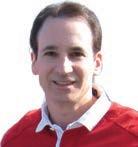 Marc A. Simon
Marc A. Simon
Oct. 27, 2018 will forever be remembered as the single darkest day in the history of Pittsburgh’s Jewish community. The horrific murders of 11 Jewish individuals gathered in Sabbath prayer inside the Tree of Life building embodied the most evil and deadliest antisemitic attack in U.S. history.
It is with great consternation, disappointment and sorrow to realize that Tree of Life Congregation’s rebuild plan does not include preserving a site of the attack, the Pervin Chapel, in its present form, but instead calls for razing it, saving some of the artifacts for placement in other spaces.
The Pervin Chapel is where my parents’ lives together began, on Dec. 22, 1956, at their wedding ceremony, and then were tragically and senselessly ended on Oct. 27, 2018, when they and others were brutally murdered there.
Preserving the Pervin Chapel should be the first priority in the rebuild plan, and the new building should be constructed around and incorporate it. Without the horrific events of Oct. 27, it is unlikely there would be any plans for a rebuild, and surely none comparable in scope to what is now being considered.
My strong desire to preserve the Pervin Chapel is not about me or my family. It is also not shortsighted. If the Pervin Chapel is razed, future generations will have no realtime connection to the tragedy that occurred and to the lives that were lost there. After we are gone from this earth, there will be nobody left to tell the story firsthand. It is incumbent upon us to ensure that this tragic event does not get diluted or lost in time and the beautiful souls are remembered in perpetuity as forever tied to this tragedy. The best and most effective manner to reach that end is to
preserve this site of the tragedy — exactly as it was left in the aftermath.
Everything within the confines of the Pervin Chapel tells a story. The bullet holes in the walls, in the steps and in the ark, and the pews, furniture, carpet and other artifacts, should all be preserved exactly as they were left.
Future generations must not be denied the opportunity to experience the utter and absolute horror, terror and helplessness, agony, pain, shock, loneliness, abandonment and disbelief that the congregants experienced as they realized they were about to be shot and killed. Future generations will need to connect physically and emotionally to what occurred in that space in order to fully comprehend the magnitude of the most horrific antisemitic event in U.S. history. That can only be achieved by leaving the Pervin Chapel intact, not by photographs or models.
The Pervin Chapel was a place where friends gathered each Saturday morning in prayer and to share each other’s company. It included both tangible and intangible facets of life that they looked forward to experiencing as a group. That commonality of experience is what ultimately led to their being present on that fateful morning. That must never be forgotten.
Future generations must be afforded the opportunity within the appropriate space to mourn the loving souls who shared the same religious ideals and customs. Future generations must know what precipitated the tragedy and the whole of what transpired there on the morning of Oct. 27, 2018.
It is indisputable that the Pervin Chapel is one of the most historically significant spaces relative to Judaism and antisemitism in the United States. Understandably, a preserved Pervin Chapel will not be used for any purpose other than historical significance, learning, education and memorialization. While some may be physically or emotionally unable to enter that sacred space, it is
important to remember that none of us lives forever; this issue is about preservation for future generations, and not about us.
Throughout Europe, concentration camps have not been purposely destroyed, bulldozed or rebuilt. Many have been meticulously preserved and maintained for their historical significance, to memorialize the people murdered on those sacred grounds and for educating generations, worldwide, on the evils that occurred there. In the same manner, we must preserve the Pervin Chapel, a sacred space, in its present condition to provide a lasting physical artifact of what occurred, and to remind Jewish communities to remain vigilant and aware in the fight against antisemitism.
The USS Arizona battleship was not recovered from Pearl Harbor in order to clear the inlet. It remains in the exact location where it met its harrowing fate on Dec. 7, 1941. Upon arriving at the memorial, visitors can look into the water and see the top of the once-mighty battleship. They can also see the sheen on the water and smell the odor of fuel oil as it slowly bubbles up to the surface from the bottom of the ship. This memorial tells a story of brave Americans performing their duty under the horrors of war while paying the ultimate price. It takes people back, both physically and emotionally, to the time and space of the tragedy. This most unique human perspective can be achieved only because the actual site was preserved. For similar reasons, we must also preserve the Pervin Chapel.
The battlefields of Gettysburg, where approximately 50,000 Americans were killed in 1863, are not paved over and replaced by shopping malls or housing developments. They remain intact as a solemn reminder of the horrors of war, the extreme sacrifices of soldiers’ lives lost and the causes they fought for in the bloodiest battle of the Civil War. This perspective can be achieved only
Last week, the Chronicle asked its readers in an electronic poll the following question: “Have you started getting ready for Passover yet?” Of the 194 people who responded, 54% said no and 46% said yes. Comments were submitted by 30 people. A few follow.
Too early. I’ll wait another two weeks.
I need a Pesach kitchen.
One-person household. Major grocery stores have very limited Passover items (hey — where’s the egg matzah?!). Might bake a few things but no one to cook for except myself.
Going to Israel for Passover.
Wish I had more vegetarian recipes. The preparations involved with Passover
Have you started getting ready for Passover yet?
46% Yes
54% No
are quite the task, from cleaning every room and carefully kashering the kitchen, to buying and preparing food. However, I look forward to the Pesach seders and, of
course, the main event — enjoying eating my matzah, butter and apricot preserves for eight days. Yum!
As a young wife and mother, I prepared for Pesach weeks and weeks in advance: changing dishes, relining cabinets and countertops, vacuuming every corner for crumbs, buying appropriate food. Now, as an elderly woman who lives alone, I do little to get ready for the holiday — except to buy a box of matzah and a jar of gefilte fish.
I’ve been thinking about it for several weeks, but haven’t actually done anything yet. It doesn’t matter how early you start; you always need more time! But starting early does keep the stress down.
I’ve cleaned up a different part of the house each weekend, and I already have
because the actual site was preserved. For similar reasons, we must also preserve the Pervin Chapel.
Ohrdruf concentration camp, near Gotha, Germany, was the first Nazi camp liberated by American forces. Soldiers of the Fourth Armored Division and the 89th Infantry Division entered the camp on April 4, 1945. After being informed of the unimaginable and horrific conditions encountered, Gen. Dwight D. Eisenhower visited the camp on April 12 with Gen. George S. Patton and Gen. Omar Bradley. He wrote to Gen. George C. Marshall, chief of staff of the Army, to say, “I made the visit deliberately in order to be in a position to give first-hand evidence of these things if ever, in the future, there develops a tendency to charge these allegations merely to propaganda.”
Eisenhower was so shocked by what he saw that he purportedly ordered his men “to collect as much proof, films and testimonies as possible, because the day will come when some son-of-a-bitch will say that this never happened.” In the same vein, we must follow Eisenhower’s example by preserving the Pervin Chapel in its present form so that future generations can bear witness.
Razing the Pervin Chapel would deny meaningful memorialization, crucial educational opportunities, an emotional connection and irrefutable historical corroboration of what happened on Oct. 27, 2018. These historical aspects exist within the space of the Pervin Chapel and must be preserved.
To this end, I respectfully ask and hope that Tree of Life Congregation’s leaders respond to this plea before the Pervin Chapel is destroyed and gone forever, and find a way to preserve this important piece of Pittsburgh and American Jewish history in its present form and location. PJC
Marc A. Simon’s parents, Bernice and Sylvan Simon, were murdered in the Tree of Life building on Oct. 27, 2018.
my kosher for Passover Sephardic menu!
I do kasher my refrigerator, kitchen cabinets and drawers, but I will start next week and then cook for the seders.
I usually start a week before.
I shopped, but I still need to make a seder menu. And plans for every other day. Yikes!
Although I see the Passover items at the grocery store, I am not ready to shop.
So much to do, so little time! PJC
Toby TabachnickChronicle weekly poll question: Have you seen the two documentaries about the Pittsburgh synagogue shooting? Go to pittsburghjewishchronicle.org to respond. PJC
Anthony Fienberg
Howard Fienberg
Alan Mallinger
Amy Mallinger
Stanley Mallinger
Diane Rosenthal
Elie Rosenthal
Joy Rosenthal
Michele Rosenthal
Andrea Wedner
Over the past four-and-a-half years, how to remember our loved ones is a question with which we have wrestled, both individually and together. It’s been a long and difficult journey. We have not always agreed, but we kept listening to each other and we found places of agreement and a path forward to memorializing our family members murdered on Oct. 27, 2018, at the Tree of Life synagogue building.
Lead architect for rebuilding the Tree of Life, Daniel Libeskind, local architect Daniel Rothschild and their teams have spent countless hours with us — those of us whose names appear on this piece and those whose names do not — listening to our hopes and dreams for the future of the building and memorial. They have helped us consider the different ways we might remember our loved ones and how the physical space can support our remembrance. They’ve listened to the desires of each of the families who lost someone on 10/27, the hopes of the survivors and the needs of the congregation that will return to the building.
Holocaust survivor Elie Wiesel once wrote that G-d gave humans a secret — not how to
begin, but how to begin again.
The building as it existed on Oct. 26, 2018, is gone. We cannot go back and undo what was done. If we could, each and every one of us would choose more time with our loved ones. And so we must begin again. We must imagine new possibilities for the building and not allow ourselves to be paralyzed by grief and anger at the injustice our families experienced.
Our loved ones’ names will forever be tied to the horrors of 10/27, but we don’t want them to be solely remembered for how they were killed; we want them to be remembered for how they lived. We learn from Torah portion Chaya Sara (Genesis 23:1), which describes the burial of the first Jew, that, as the title suggests, we should focus on the life of Sara.
Our mothers and grandmothers — Joyce Fienberg and Rose Mallinger — and our sons and brothers — Cecil and David Rosenthal — loved the Tree of Life and the Pittsburgh Jewish community. The building was a second home and the congregation an extended family. We attended services. We went to Hebrew school. We celebrated b’nai mitzvot, both our own and our friends’.
The designs and plans for the reimagined Tree of Life give us hope and excitement that future generations of Jewish families will be able to have the same happy memories that ours did. Vibrant Jewish life will be able to return to the corner of Shady and Wilkins where it has been for generations. There will be weddings, b’nai mitzvot, Shabbat and holidays. The raucous laughter and noise of Purim celebrations will ring through the hallways once again.
While those memories will be formed
The Pittsburgh Jewish Chronicle invites you to join the Chronicle Book Club for its April 16 discussion of “Koshersoul” by chef Michael W. Twitty. The memoir was named Jewish Book of Year for 2022 by the Jewish Book Council.
From the Jewish Book Council: “Twitty’s book is a record of lives lived and meals cooked. Through a combination of interviews, oral histories, personal anecdotes, recipes, history, and advice, he details the ways that Black and Jewish food traditions perceived to be disparate have overlapped, influenced, and mirrored one another throughout history. He writes of how diasporic living, migration, oppression, marginalization, and movement shapes food.”
Your hosts:
Toby Tabachnick, editor of the Chronicle
David Rullo, Chronicle staff writer
How and when:
We will meet on Zoom on Sunday, April 16, at noon.
Buy: “Koshersoul.” It is available at area Barnes & Noble stores and from online retailers, including Amazon and Barnes & Noble. Several copies are available through the Carnegie Library system.

Email: Contact us at drullo@ pittsburghjewishchronicle.org, and write “Chronicle Book Club” in the subject line. We will send you a Zoom link for the discussion meeting.
Happy reading! PJC
in a building dramatically different than the one in which ours were formed, familiar elements will be preserved, including the well-known limestone facade and the beloved stained glass windows depicting the intertwined stories of American and Jewish history. The Pervin Chapel, where part of the attack occurred, will be entirely reimagined and transformed into a space of memories that, as Mr. Libeskind previously told the Chronicle, “creates the sense of importance of that particular space” and provides all who visit the Tree of Life the opportunity to remember and honor the 11 who were killed on 10/27.
In addition to the memorial, developed collaboratively with the families of the 11 to be honored, the building will house a museum that tells the story of that day as well as the roots and ongoing existence of antisemitism. The museum will house elements from the Pervin Chapel and other parts of the building that were damaged in the violence that day. Taken together, the Pervin Chapel, museum and memorial will move us forward to ensure that Tree of Life continues to be a vibrant hub of Jewish life in our city while telling a compelling and necessary story so that future generations can never forget what we suffered on 10/27.
Most prejudices begin at home. There’s no vaccine, booster, patch or pill to cure hate. The only cure for the hate and antisemitism that fueled 10/27, in our opinion and those of many experts, is education and to start that education young.
We’ve been grateful to have the opportunity to share stories of our loved ones with experts like Libeskind,
as well as Ralph Appelbaum, who leads an internationally-recognized “practice dedicated to the planning and design of museums and narrative environments.”
Each of the experts understood the importance to us of educating people as part of how we choose to remember our family members. As the experts worked with the new Tree of Life’s leadership and Interim Governance Committee, which includes representatives from all three congregations impacted by 10/27 alongside community volunteers, they took care to meet with victims’ families and survivors to share their draft plans and seek feedback that they interpreted and incorporated into the next iteration of the plan.
We are hopeful that this new chapter for Tree of Life will be an opportunity to welcome more people in — just as Cecil and David once welcomed everyone who came through the doors to share their beloved building — to learn, pray and cultivate community.
When the new building opens its doors, it will be simultaneously a place to remember our loved ones and what happened on 10/27, a space for the return of vibrant Jewish life and practice, and a place for individuals of all ages to learn about not only what happened, but also why it happened and how to counter antisemitism in the future. PJC
The Fienberg, Mallinger and Rosenthal families are the loved ones of four of the victims from the Tree of Life Congregation killed on Oct. 27, 2018. In total, 11 people were killed from three congregations that day.
When the topic of recent events in Israel came up, a friend of mine last week said: What we are seeing now in Israel is the logical consequence of the policies of many years. People debate about a two-state or one-state solution, but that is missing the point. The settlements are illegal, and the occupation is immoral. We have to deal with that.
While blunt, I think she hit the nail on the head. To borrow a phrase from Hillel, everything else is commentary.
Eileen Kraus-Dobratz Friendship Toby TabachnickLetters
Address: Pittsburgh Jewish Chronicle 5915 Beacon St., 5th Floor Pittsburgh, PA 15217
Fax: 412-521-0154
Website address: pittsburghjewishchronicle.org

There is an Indian restaurant close to my home, and I salivate when I smell its cooking in the air. A vast amount of Indian food is vegetarian and easily adaptable to a kosher diet, but one thing I’ve missed for the past 20 or so years is tandoori chicken.
The ingredient that makes or breaks the recipe is yogurt, so it’s a recipe that I have avoided. The advent of pareve, vegan plant-based yogurts and other faux “dairy” products has been a game-changer for my home cooking and for the kosher world in general. They are not identical to real dairy products in flavor or consistency, but they surely make it easier to satisfy my cravings.
There is no reason that we can’t enjoy ethnic cuisine from around the world in a kosher home.
This recipe takes about 15 minutes of prep work, then you simply marinate the chicken for 6-8 hours in the refrigerator and broil it in the oven. My recipe will provide a close copy of real tandoori chicken, which is made in a special clay oven — I won’t pretend that it’s as good as the real deal because the ovens that they use are not what we have in our home kitchens.
The spice mix is flavorful but not too spicy, and it will definitely bring something new and exciting to your table. If you can get the marinade pulled together in the morning, this makes a great weeknight dinner with the bonus of an easy clean-up.
2-3 packages of chicken drumsticks (10-14 pieces)
1 cup plant-based pareve yogurt
2 tablespoons fresh lemon juice
4-5 cloves of garlic, minced
2 tablespoons fresh ginger, minced or crushed
1 teaspoon sea salt
3 tablespoons of oil with a high smoke point; do not use olive oil
1 tablespoon garam masala spice blend
2 teaspoons sweet paprika; do not substitute hot or smoked paprika
1 teaspoon ground coriander
2 teaspoons cumin
1 teaspoon ground turmeric
½ teaspoon cayenne pepper (double the amount if you like more heat)
Measure all the dry spices, and place them together in a small bowl.
Heat the oil in a small sauté pan over medium-low heat for about a minute. Don’t let the oil get too hot, or it will burn the spices.
Add all of the spices at once to the pan, stirring constantly for about 2 minutes, until the mixture becomes fragrant. This brings out the aromatics of the spices, and this is what Indian food is famous for.
Remove the pan from the heat, and set it aside.
Mince the garlic and the peeled ginger. Fresh ginger is very fibrous, and it’s easiest to use a microplane tool to grate it, or simply crush it in a mortar and pestle if you don’t feel like taking the time to mince it with a knife.
Add one cup of vegan yogurt to a large bowl, and mix in the fresh lemon juice, garlic, ginger and salt.
It takes about 10 minutes for the spice mixture to cool down. Once it’s cool enough to handle, use a rubber spatula to scrape every last bit of oil and spice into the large bowl and mix well.
rack (the kind you cool cakes and cookies on) over the sheet pan. This creates a grill effect in the oven. A smaller rack will fit right over the pan, but you can use one that’s larger — just be sure to support the bottom pan when placing it and removing it from the oven.
If you’ve ever broiled fresh liver, it’s the same technique: The chicken sits on the top rack, and the bottom pan catches the mess. If your grate is a bit larger than the pan, be sure that the chicken pieces are not right against the edges of the grate or the cooking juices will drain into your
reaches 165 F on a thermometer.
I cook the chicken for about 25 minutes, but you can cook it to your preference; make sure there are some charred spots on the chicken.
Remove from the oven, and serve immediately.
This pairs well with steamed rice and/or lentils. You can make a quick raita (yogurt and cucumber dip) by pressing the water out of a cup of grated cucumber and adding it to the leftover yogurt with some lemon juice, a teaspoon of dried mint and a sprinkle of salt and cumin. This is not authentic raita, but it’s
I wear disposable gloves for the next part. Using a sharp knife, cut 2 or 3 deep diagonal slashes across one side of each chicken leg, close to the bone.
Add the chicken to the bowl of yogurt. The slashes ensure that the spices really get into the meat. You can remove the chicken skin if you prefer; the marinade will help the chicken stay tender.
Mix well, cover with plastic wrap and refrigerate for 6-8 hours.
When it’s time for dinner, set your oven to broil at 500 F. Line a sheet pan with foil or parchment paper and place a metal cooling
oven and cause a big mess.
Place the oven rack on the shelf closest to the broiler; in my oven, this is the highest slot that I can place a rack.
Place each piece of chicken on the top rack, leaving a few inches between each piece. This is the best way to get grilled flavor while cooking indoors.
Take any remaining yogurt from the bowl, and gently spoon it across the top of the chicken pieces, patting it onto the chicken so that there is a thick layer across the top and sides.
Broil for 20-22 minutes, until the meat
close enough and adds a wonderful addition to the spice of the chicken while using up the rest of the yogurt.
Garnish with sliced spring onions or chopped fresh cilantro, and serve with a few extra lemon wedges for those who like a little extra zing — like me!
Experiment! This is a great recipe, but if you want more of one spice or less of another, adjust it to your taste. Enjoy and bless your hands! PJC
There is no reason that we can’t enjoy ethnic cuisine from around the world in a kosher home.



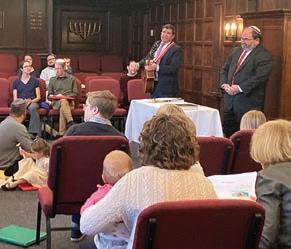 By Justin Vellucci | Special to the Chronicle
By Justin Vellucci | Special to the Chronicle


Pittsburgher Chaim Steinberg — a teacher at Community Day School and city coordinator for Pittsburgh Young Judaea — didn’t attend Jewish day camps as a child. He didn’t have a lot of “Jewish experiences” growing up.
But, in his senior year of high school, he started working at the Emma Kaufmann Camp, or EKC, in Morgantown, West Virginia. The job, which lasted for six full summers, introduced him to the mother of his children and led him to become a Jewish educator.

His mission at the Pittsburgh chapter of Young Judaea is simple, he told the Chronicle.
“I want to create a more complex and nuanced interaction with Judaism and the practice of Judaism,” Steinberg said. “Young Judaea does pluralism really, really effectively — there seems to be a space for all [forms of Judaism and Jewishness], and that’s an exciting thing to see.”
Young Judaea is seeking campers for its summer sessions in central Wisconsin. There, participants take part in activities centered around Jewish values and Zionism at an 80-acre lakefront facility about three hours north of Chicago.
Camp Young Judaea Midwest has served
campers since 1969 — and there’s a loyal contingent of Pittsburghers who attend year in and year out.
“We focus on an individualized approach while teaching campers to work in a group setting that fosters mutual respect, friendship, leadership and development,” Camp Director Hannah Wallick said. “Our pluralistic approach allows campers and staff to learn, grow and play together and to encourage them to make informed choices about their Judaism and connection to Israel.
“With the help of the CYJ community,” she added, “camp is a place where kids can be the best version of themselves.”
Steinberg’s children go to Camp Young Judaea Midwest in the summer. So does Merav Amos’ youngest daughter, who also attends Community Day School.
“She started going three years ago — we started when it was still in the middle of COVID,” Amos said. “This is a great camp. It’s a small camp. It’s intimate. The counselors know every kid.”
At Camp Young Judaea Midwest, there are about 150 kids in all.
The bonds they form there are strong, Amos said. Her daughter recently trekked to Chicago for the bat mitzvah of a fellow camper. She was accompanied by other Pittsburghers who go to the camp every summer.
“They come with friends, and they make new friends,” Amos said. “It’s beautiful — it’s a wonderful camp.”
Young Judaea also works to connect young Jewish Pittsburghers throughout the year. Between camp sessions, the group sponsors various events and activities. To paraphrase Steinberg, though, it’s not Jewish teens hanging out. It’s teens hanging out Jewishly.

The group had a Chanukah celebration with a local women’s organization, blurring the line between tzedakah, service and ceremony. Young Judea members recently volunteered at a food bank. And they enjoy talking Jewishness and baseball and attending Pittsburgh Pirate games.
A child does not need to be a camper to take part in the year-round activities with the group, Steinberg said.
“I like how Young Judaea has incorporated




Judaism into all the little places,” Steinberg said. “There is an acceptance of everybody here — Judaism can and should be like a great, big umbrella.”
Barbara Baumann, a Pittsburgh parent and president of the board of directors for Camp Young Judea Midwest in Wisconsin, said she thinks of Camp Young Judea as “being pluralistic both in regard to religious practice and Zionism.”
“It’s big-tent Judaism,’ is the way people say it now,” she said. “We want to include everybody’s practices and what it takes to make sure everyone can be comfortable.” PJC
Justin Vellucci is a freelance writer living in Pittsburgh.





The menu for Passover desserts is limited; no flour means cakes, cookies and muffins are off-limits unless they’re made with matzah meal or some other, unorthodox — and usually dense — substitute. Because of the lack of options, a few iconic classics have come to dominate the marketplace: canned coconut macaroons, gummy fruit slices and, for some people, marshmallows.
Never heard of marshmallows for Passover?
You’re not alone. I posted a hard-hitting kosher-for-Passover marshmallow survey on social media, and a bunch of respondents had never heard of such a tradition. Sure, marshmallows happen to be kosher for Passover — as one respondent pointed out, so is cheese — but they’re not a specific Passover food.
The rest of the responses, however, came from k-for-P marshmallow fanatics. For them, nothing beats a chocolate-covered, Joyva brand k-for-P marshmallow, ideally kept in the fridge or freezer for an iconic snap.
While marshmallows are, of course, a yearround treat, kosher markets explode with them around Passover, stocking giant bins full of options: the classic fluffy white pillows, mini
marshmallows for hot cocoa, rainbow swirled ’mallows, and chocolate dipped and coconut coated varieties (to complement your macaroons, of course). Many of the flavors are only available around Passover, and some respondents said kosher ’mallows were only available at all in their area during the Pesach season.
Perhaps this trend developed because marshmallows, in general, are deeply American. According to the National Confectioners Association, Americans buy the majority of the world’s marshmallows, to the tune of about 90 million pounds a year.
But marshmallows, at least as they’re made
today, with gelatin, aren’t kosher at all, much less kosher for Passover. Most gelatin is made from non-kosher animals; the kosher varieties have to sub in a fish-based gelatin as a replacement. Which makes them seem like a pretty goyishe food. But marshmallows, it turns out, are really quite Jewish.

As with Passover itself, it all started in Egypt. The marsh-dwelling mallow plant — yes, the marsh mallow, you get it — had long been used as a medicinal plant by numerous civilizations, including the Romans and Chinese, who used it to treat a wide range of ailments such as sore throats, constipation and low libido. But it was astringent and woody and barely edible; definitely not a treat.
Egyptians created the first marshmallow-like sweets around 2000 B.C.E. by mixing honey, nuts and grains with sap laboriously extracted from the mallow plant; the sap’s thick consistency enabled the confection to congeal into a stable form; the result was reserved for nobility and offerings to the gods. No one truly knows what it was like, but some food historians postulate that it may have been similar to halva, and, indeed, some ancient halva recipes include mallow.
Perhaps the ancient Israelites stole the recipe before they made their way across the
Red Sea, but it seems unlikely given the whole too-rushed-to-let-bread-rise thing. Instead, the next leap in marshmallow technology came in France, where whipped egg whites were combined with sugar and mallow extract and then left to dry out, creating a meringue-like confection called pâte de guimauve. It, too, was still sometimes prescribed as a sort of lozenge — a dessert with medicinal applications.
People loved it, but it was far too hard and labor-intensive to meet demand; extracting mallow sap takes something like 12 hours of boiling and straining, you had to hand-beat the egg whites because electricity was not yet a thing, and then the result still had to dry for hours before it could be cut or formed.
Over time, this led to the addition of other ingredients, such as gum arabic as a stabilizer — which was one of the roles the mallow root originally played. This was the first step toward today’s highly processed, corn syrup-filled version, which is devoid of any mallow.
The modern ’mallow

The next marshmallow leap was gelatin. Originally, this was not a great dessert ingredient; it tasted rather like the bones that were used to create it. But then we got unflavored gelatin in the late 1800s and the cheap, flavorless
Please see Marshmallow, page 17
Crafting strategies that allow you to keep more of your assets during your lifetime;
Exploring the many payment options for disability and longterm care services;


Designing instruments that protect your assets from Medicaid spend-down requirements;

Ensuring that your affairs will be handled the way you want if you experience a serious injury or illness; and


Administering your estate to ensure proper distribution of your assets while minimizing any taxes owed.
We help families understand the strategies, the bene ts, and the risks involved with elder law, disability law and estate planning.

Continued from page 16
alternative struck the final deathblow to the mallow part of the marshmallow. Around the same time, people figured out how to make marshmallows in starch-covered molds, which allowed them to be manufactured at greater scale and in different shapes. (I’m looking at you, Peeps — which, incidentally, were created by the son of Jewish immigrants, though the chick-shaped marshmallows are not kosher.)
This is more or less when the marshmallow came to America, its true home ever since. There was a massive marshmallow craze in the early 20th century, and marshmallows became a pantry staple. Recipe books, trying to keep up with interest, exploded with overly creative concoctions like marshmallow omelets and marshmallow-topped lima beans. This is also when “marshmallow roasts” — a party for toasting marshmallows over a fire — became popular.
In the 1950s, Alex Doumak of the stilldominant Campfire Marshmallow company invented an extrusion marshmallow manufacturing process, in which a machine forced the marshmallow mixture through tubes, which created a uniform, easy to manufacture shape and allowed the sweet white pillows to be made on a grand scale. Finally, there could be enough marshmallows to go around.
Jews were in on the trend. Amateur historian Rabbi Yael Buechler did some digging for me, and found ads from as far back as
1933 advertising marshmallows to a Jewish audience; a Yiddish spot in Der Tog from the non-Jewish Campfire Marshmallows company promotes marshmallows for Thanksgiving.
But because of the pork-based gelatin, marshmallows weren’t kosher. “Back then, marshmallows were probably seen as an ultimate ‘treyf’ candy,” said Andrew Wachtfogel, who reached out in my survey; he told me that his grandfather, Rabbi David Wachtfogel, was the first to give kosher supervision to marshmallows, which became a “sensation.” In fact, it appears that the Jewish demand for marshmallows was so high that it catalyzed the creation of the kosher fish gelatin they require. It was such a boon to the community that Wachtfogel said he is still approached today by people wondering if he is related to “the marshmallow rabbi.”
The result was an instant hit. By the late 1950s, when one of the first Passover marshmallow ads appeared, marshmallows had become a Passover treat. Kosher markets boasted about new merchandise for Passover, including chocolate-covered marshmallows. Stores advertised with sample Passover shopping lists, featuring as many as three varieties of marshmallows. Why exactly the confection made the leap from a general sweet treat to a Passover-specific one is unclear — but its place in the Jewish foodscape was secured.
For many people, the association of marshmallows with Passover is partially
because of availability, though that does raise a chicken-and-egg question of whether Passover-specific demand led stores to stock them for the holiday, or the reverse.
“When I was a kid (’80s and ’90s) there were a lot of foods you couldn’t get kosher most of the year. Marshmallows were one of those,” wrote Ari Elias-Bachrach of Philadelphia. “We could only get them at Pesach time because the local grocery stores would get tons of kosher food brands imported for Pesach.” He added that everyone would stockpile the marshmallows to have enough for summer barbecues as well.
However the marshmallow cart got hitched to Passover, it’s there now. In my survey, Jews from across the U.S. wrote about using the treat as part of their seder tables, to illustrate the plague of boils, and looking forward to the flavors that were only available at Passover, even if they were generally able to get kosher marshmallows year-round. Others said the general dearth of available foods on Passover led to the sweet treats taking on a particular appeal.
“I had one of those ’70s health-food moms, so candy showing up in the house was a big deal. Marshmallows were never in the house otherwise,” wrote one respondent. “I didn’t even like them that much, but what I did like was that there was candy in the house and I could eat it.”
Today, at least based on the responses to my survey, Joyva dominates the Passover market. The family-owned, Brooklyn-based confectionery is better known for its sesame
products, such as halva — in fact, it’s the largest manufacturer of halva in the U.S. But its marshmallows are iconic enough that they have to up manufacturing in November to meet the springtime holiday’s demand.
“Great texture on the Joyva ones. Love the raspberry flavor!” wrote Jacob Devine of Baltimore, Maryland. “As far as I know, my family has been eating Joyva marshmallows for at least three generations.”
Are they good, though? Kosher marshmallows are, unavoidably, a little different than the regular variety. People wrote about storing them in the refrigerator for ideal texture, though they didn’t seem to mind; in fact, a cold marshmallow seems to be their platonic ideal of the form.
Much like the iconic canned macaroons, however, just because something is tradition doesn’t mean it’s beloved. While some people view the marshmallows with warm, holiday nostalgia, the best others could muster was that marshmallows were the best option on Passover, pointing out that the bar is low. Others straight-up said the ’mallows are a plague themselves.
But sometimes, tasting like tradition is more important than a tasty tradition. As one person wrote, “The marshmallows may be gross but that’s just another Jewish family in my book — because Gross is also a Jewish name.” PJC
This story originally appeared in the Forward. To get the Forward’s free email newsletters delivered to your inbox, go to forward.com/newsletter-signup.


Noga Shemesh is the daughter of Tammy and Or Shemesh, sister of Yoav and Galia Shemesh, granddaughter of Moshe and Ronit Shemesh and Yehudit and Amazia Kaplan. In the seventh grade at CDS, she runs track and field, plays basketball and likes reading through every book she can put her hands on. She possesses a sharp analytical mind, which helps her in math and science. Noga becomes a bat mitzvah at Congregation Beth Shalom on March 25, 2023.
Rabbi Barbara AB Symons Parshat Vayikra Leviticus 1:1 – 5:26Happy New Year!
Yoav Shemesh is the son of Tammy and Or Shemesh, brother of Noga and Galia Shemesh, grandson of Moshe and Ronit Shemesh and Yehudit and Amazia Kaplan. In the seventh grade at CDS, he plays basketball and soccer, scales climbing walls and likes writing fiction. He is an avid learner of world and Jewish history. Yoav becomes a bar mitzvah at Congregation Beth Shalom on March 25, 2023.
There was no sound of the shofar (Rosh HaShanah) or tree planting (Tu B’shvat), but on March 23, the Jewish community entered a new year. In fact, it was the new year in that it was the first day of the first Hebrew month Nisan. None of that Rosh HaShanah language of “On the first day of the seventh month,” which leads to great confusion. (Per the Mishnah, there are four new years, each marking a different type of accounting.) This time, it is actually the first day of the first month, so: Happy New Year!
We celebrate this new year by having a special haftarah portion the Shabbat prior as an announcing tool and naming that Shabbat not the typical “Rosh Chodesh” — “new month” — but “HaChodesh” — “the New Month.” That is where the celebration more or less ends while the shopping lists and plans for Passover begin in earnest. Two weeks and counting.
Rabbi Abba Hillel Silver teaches in “Where Judaism Differs: An Inquiry into the Distinctiveness of Judaism” (Philadelphia: Jewish Publication Society, 1957): “The moral life and human aspirations are the ‘sacraments’ of Judaism. It recognizes no others. There are no beliefs which ‘save’ men. There are no ceremonial or ritual acts the very performance of which bestows supernatural grace and saving power. There are visible symbols in Judaism, signs of the covenant, memorials of fidelity, but no sacraments. From earnest and faithful quest of the good life, in all ways, great or small, flow all divine grace and power.” This excerpt, brought forward by Rabbi Dana Evan Kaplan, PhD, in the book I edited, “Prophetic Voices: Renewing and Reimagining Haftarah” (CCAR Press), offers us an invitation to consider what “doing sacred” looks like today for all of us, not only the Kohanim and Levites who had front row seats in ancient times.
It is with great pleasure that Judy and Eric Rogalsky of Pittsburgh announce the marriage of their son, Justin Scott Rogalsky to Samantha Marie Norris. Samantha is the daughter of Jamie and Steven Norris of Enon, Ohio. Justin is the grandson of Sally Rogalsky, the late M. Alan Rogalsky and the late Lois and David Shapiro, all of Pittsburgh. Samantha is the granddaughter of Ralph Norris, of Decatur, Alabama, the late Peg Norris and the late Kathy and William O’Connor of Springfield, Ohio. Justin is a graduate of Ohio State University and is employed as a business development manager for Xclusive Services. Samantha is a graduate of Bowling Green State University and is a client relationship manager for LeaderStat. The wedding took place on Dec. 3, 2022, in Columbus, Ohio. Justin and Samantha enjoyed a honeymoon in Aruba and reside in Columbus with their dogs, Clyde and Penelope.



In the first days of this New Year, we are engulfed in the Torah portion Vayikra. The tabernacle is complete and consecrated and ready for use. The menu of offerings is described in detail: sin offerings, good will offerings, guilt offerings ... But alas, the tabernacle and even its successors, the First and Second Temples, no longer exist. How do we connect to a type of sacred donation that not only no longer exists but which many of
Rabbi Kaplan calls us to action in his commentary: “We agree with Rabbi Silver that beliefs do not bestow divine saving power upon humans. Judaism is urging us to take advantage of our short lives to do something good in concrete terms for our fellow human beings and for the world.”


It sounds like a New Year to me. PJC
Rabbi Barbara AB Symons is the rabbi of Temple David. This column is a service of the Greater Pittsburgh Jewish Clergy Association.

This Shabbat we begin a new book of the Torah, Leviticus. Notable for its unending commandments concerning sacrifices and temple rites, Leviticus easily blurs the eyes and dulls the senses. Do we really need to continue to study outmoded practices and actions which few if any of us ever hope to resume?
Majestic Landscaping and Contracting Services
Specializing in Lawncare and commercial painting services include, cutting grass, mulching, planting annuals and perennials, shrub removal, weeding, interior and exterior painting.
445-444-9446
• 23 Years Experience
• Dependable
• Strong
•
And yet, as the Sidra opens, we hear two of the most powerful words in all of Torah: Vayikra Adonai — God called! That simple statement, so easy to skip, says so much to all of us. Our God calls us! God requests our attention! God seeks us! God wants communication with us!
The opening words of the portion remind us that we exist in relationship with God. No matter how far we may roam, no matter how far our questioning or lack of belief might lead us, God still needs us. We live in covenant with the Almighty; both we and God need the other.
God calls to Moses, and through Moses, to each of us. God desires that we engage, that we connect, that we interact. God calls us collectively and individually. We are called to gather, and we are called to rise to our highest selves.
Nowadays when the phone rings we can see who is calling and decide whether we wish to answer. All of us have made the choice at one time or another to ignore a call. Some of us only answer a call if we recognize the number. Others of us are more willing to answer any call.
In beginning of the book of Leviticus, with a call, our text reminds us that we have choices. We can choose to follow the commandments literally or not. We can choose to answer the call and engage or to ignore the call and try to blur into the background. We can choose to be a part of the great endeavor of Jewish peoplehood, or we can go our own way. But make no mistake: God wants us to engage!
Pesach will soon arrive, and after that, the counting of the Omer and Shavuot. Our tradition calls to us to connect with our past, to look to the future, to interact with each other as sacred partners. God calls us — each one of us. And each of us in our own way answers.
Vayikra Adonai. God calls. Va’anachnu magivim. We respond. May the weeks of reading Leviticus remind us of our shared commitments — us to God and God to us. And when God calls, let each of us be motivated to answer, to respond, to connect with the Almighty and each other. PJC






Abraham Zarem was 28 when he joined the Manhattan Project, the vast U.S. government effort to develop the atom bomb.
Engineers like him gathered in secret laboratories in New Mexico, California, New York City and elsewhere to provide the practical know-how the theorists lacked.
“‘They were geniuses, but didn’t know how to build a f—king thing,’” Zarem recalled, according to his longtime rabbi at Sinai Temple in Los Angeles, David Wolpe.
Zaum, who went on to a distinguished career in technology, business development and leadership management training, died March 8 in Los Angeles. He was 106, and one of the last surviving members of the army of scientists, technicians, bureaucrats and clerks who helped build the weapon that would force Japan’s surrender in World War II and usher in the Atomic Age.
After the war, Zarem joined the staff of the United States Naval Ordnance Test Station
at Pasadena, where as head of the electrical section of the physical research division he developed a high-speed camera used to study intense light sources and other phenomena. Popular Mechanics called the Zarem camera — 25,000 times faster than any movie camera then available — a “miracle.”
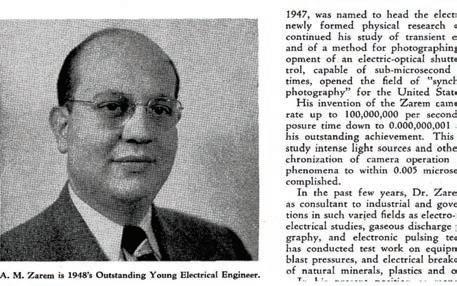
In 1963, Zarem served as senior vice president of Xerox, leaving in 1970 to launch a consulting business. He returned to Xerox as founder and CEO of its Xerox Development Corporation in 1975. He later served as founder and managing director of Frontier Associates, a technology consultancy.
Born in Chicago on March 7, 1917, Zarem was valedictorian of his undergraduate class at the Armour Institute of Technology (now the Illinois Institute of Technology), and earned his doctorate on the physical properties of the electric spark at the California Institute of Technology. He headed the Stanford University Research Institute in Los Angeles while still in his 30s.
Later he served as distinguished senior advisor for Neuroscience Technology Transfer for the UCLA Brain Research Institute and a member of the Urology Advisory Board of the UCLA Geffen School of Medicine. Additionally, he served as distinguished visiting executive in Science and Technology for Caltech’s Jet Propulsion Laboratory.
One of Zarem’s companies, ElectroOptical Systems, developed the “world’s first practical ion engine” — an experimental high-energy thruster for spacecraft. It now resides in the Smithsonian Institute in Washington, D.C.
Zarem was also a regular at Sinai Temple, where Wolpe said Zarem mentored him as a young rabbi. Zarem and his wife Esther were generous contributors to the congregation; Wolpe remembered Zarem chanting from the book of Jonah on Yom Kippur
when he was 99.
“Abe Zarem was a brilliant, buoyant, passionate, pious and philanthropic person,” Wolpe told the Jewish Telegraphic Agency this week. “He had a central role in some of the key scientific events of human history — the atomic bomb, the moon landing — and yet took an interest in everyone lucky enough to meet him. Abe was truly yachid b’mino — unique in his time. He will be greatly missed.”
Unlike with some of his collaborators on the Manhattan Project, there is no public record of Zarem grappling publicly with the moral implications of the weapon he helped develop. Years after their war work at Caltech, a man who worked under Zarem as a lab assistant said he felt no guilt, because without the detonations at Hiroshima and Nagasaki, he told a local newspaper, “We would have lost 500,000 Americans in the invasion of Japan.”
But Zarem did go on the record in 1952 on a different topic, in advice he shared with a labor and management magazine: “Keep your feet warm, and your head cool. And watch out for the hotheads with cold feet.”
His survivors include his children, Janet, David and Mark. PJC
Jewish Association on Aging gratefully acknowledges contributions from the following: A gift from ... In memory of...

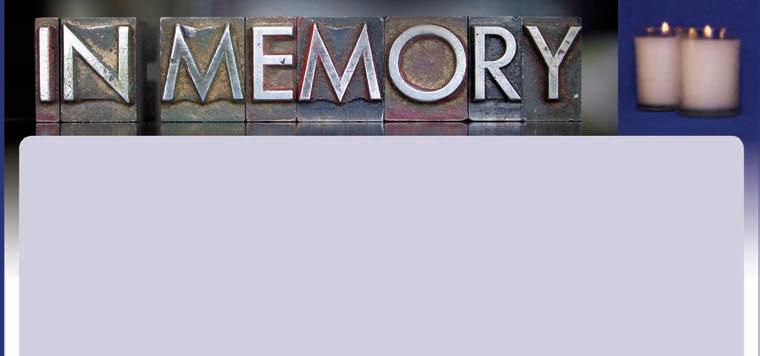
Anonymous
Anonymous






Ellen Blum
Dr Richard Glick
Jean Cohen
Joan G Israel
Joan G Israel
Sally L Kamenear
Amy R Kamin
Mr & Mrs Je rey L Kwall
Elaine M McNeill
Maxine & Larry Myer
Nathaniel S Pirchesky
Robert Rosenstein
Robert Rosenstein
Karen K Shapiro
Donna Kwall Smith
Stephanie & Nicole Zinman








Isadore Berenfield
Shelton Davis
Edgar Danovitz

William Glick
Alfred Cohen
Bernice Israel
Sidney Jay Israel
.J. Bernard Block
Marvin Kamin
Saul A Kwall
Rory S Melnick
David A Myer
Belle C Pirchesky
Eleanor Silverstein
Ruth Rosenstein
Dorothy Friedken
Saul A Kwall

Gary Zinman
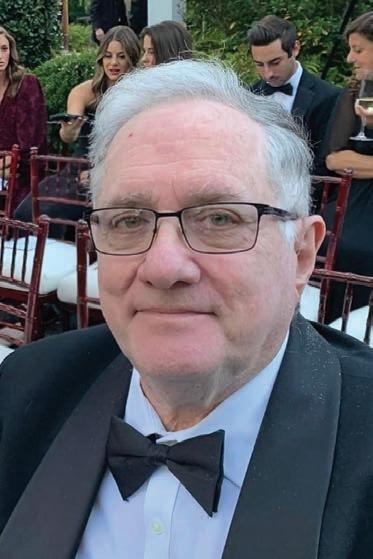
Contact the Development department at 412.586.3264 or development@jaapgh.org for more information. THIS WEEK’S YAHRZEITS —
Sunday March 26: Elliott Alber, Sanford Berman, Joseph Brody, Elizabeth Cousin, Sara Goldstein Davis, Marvin G Elman, Phillip Fenster, Freda Foreman, Marvin Kamin, William Katz, Ida E Keller, Samuel Levinson, Nathan Malt, Sarah Markowitz, Jack Marks,Samuel Miller, Samuel Mines, Albert Schwartz, Harry Schwartz, Kania Sigman, Jacob Weiner, Sally Louise Weisman, Joseph M Zaslo

Monday March 27: Alice Serbin Bogdan, Louis Caplin, Harold Erenstein, Aaron Friedland, Jacob Richmond, Rose Shrager, Irwin Silverman, Lazarus Simon, Esther Dena Stein, Jacob Steinberger
Tuesday March 28: Matilda Beck, Sarah S Berman, Anna F Davidson, Sadie Farkas, M Emanuel Heller, David T Horvitz, Myer Klevan, Sidney H Lebovitz, Bessie Lundy, Philip Singer, Sarah Sontag, Sam Vixman,Bernard Winer
Wednesday March 29: Allen Stein Amdur, Isadore Berenfield, Louis Farkas, B Joseph Green, Saul Guttman, Max Handelsman, Julia Hepps, Morris J Klein, Arthur Kramer, Mildred Lebovitz, Helen Mermelstein, Rose Beck Nathanson, Isadore M Peril, David Pollack, Shirley Rattner Lieberman, Kenneth Joel Rosen, Anna L Rosenberg, Edward S Sheinberg, William Shussett, Dr Sidney A Silverman, Tillie N Sirocca, Abe Turk, Harry Weinberger, Louis Zamore
Thursday March 30: Sol Bennett, Bernard Berry, Samuel L Case, Ralph Herny, Mollie Li , David A Myer, Leah J Rosenberg, Rose Rosenthal, Max Rotter, Louis A Schwartz, Allan Robert Shine, Sam Stein, Samuel J Weiss, Gary Zinman
Friday March 31: Harry Balber, Julia Baro , Louis Cohen, Morris Cohen, Eva Cooper, Harry Fisher, M.D., David Frank, Steven David Harris, Jean Katzman, Larry J Klein, Anna Le David Levy, Charles E Rosenthall, Pearl Baskind Sadowsky, Rody S Verk,
Saturday April 1: Milton Alderman, Benjamin Geduldig, Dora Himmel, Dorothy Leah Katz, Anne R. Levy, Betty Pearl, Israel Pick, Adele Prizant, Fannie Serbin, Ida Shrut, Sidney A Uram
BLOCK: Diane Berkowitz Block, on Tuesday, March 14, 2023. Born in Pittsburgh. She was the beloved wife of the late Gilbert Block for 63 beautiful years. Diane was the cherished mother of Susan and Dr. Robert Fishman, the late Dr. Howard (Loren) Block, and the late Steven (Kristie) Block. She was the beloved daughter of the late Isadore and Mildred Berkowitz. She had nine grandchildren that she adored: Logan and Kelsey Block, Arielle, Alec and Chloe Fishman, and Gregory, Melissa, Erica and Emily Block. She graduated from the University of Pittsburgh with an undergraduate degree in education and completed her master’s in library science. Diane taught in the Pittsburgh Public Schools for 30 years. Diane and Gilbert retired to Naples, Florida, in 2000 where she was very active in the Jewish community, volunteering with Hadassah, Brandeis, the Holocaust Museum and the Jewish Community Federation. Services were held at Ralph Schugar Chapel, Inc. Interment Beth Shalom Cemetery. Contributions may be made to Hadassah, Women’s Zionist Organization of America (Hadassah.org).schugar.com

GREENBERG: Lesley Greenberg, on Monday, March 13, 2023. Beloved husband of Vera Greenberg. Beloved father of Martin (Diann) Greenberg, Ronna Herman, Stephanie (Jason) Contreras. Brother of Joyce (Jim) Spiegel. Grandfather of Max Herman, Abby Herman, Aleksander Contreras, Isabella Contreras, Aaron Greenberg and Eliza Greenberg. Lesley was a well-respected electrical and nuclear engineer. He retired from Westinghouse after 30 years and finished his career at Fore Systems/ Ericsson. Lesley was devoted to his family and deeply loved his grandchildren. Services were held at Ralph Schugar Chapel, Inc. Interment Poale Zedeck Memorial Park. Arrangements entrusted to Ralph Schugar Chapel, Inc., family owned and operated. schugar.com
2145 BRIGHTON ROAD • PITTSBURGH, PA 15212 • 412-321-2235

Serving the Jewish Community Since 1924
CHANGE OF NAME






David J. Slesnick, Esq., 310 Grant Street, # 1220 Pittsburgh, PA 15219 412-471-4882 • djslesnick@yahoo.com

IN the Court of Common Pleas of Allegheny County, Pennsylvania: No. 0023-001876
In re petition of for change of name to John Joseph Emes, Jr. Jack Joseph Emes
To all persons interested: Notice is hereby given that an order of said Court authorized the ling of said petition and xed the 17th day of April, 2023, at 9:30 a.m., as the time and the Motions Room, City-County Building, Pittsburgh, PA, as the place for a hearing, when and where all persons may show cause, if any they have, why said name should not be changed as prayed for.
WIMMER: Harvey F. Wimmer, beloved husband of Sherry Weisman Wimmer and adoring father of Bill Wimmer and Heidi Wimmer, passed away on March 11, 2023, from complications of Parkinson’s disease. He was 85 years old. Sherry and Harvey shared a wonderful marriage of 56 years, always the most important person in each other’s lives, as they raised and cherished their children. Always the doting father, Harvey loved the time, common interests and laughter he shared with Bill and Heidi. Harvey had a passion for classic cars, especially Corvettes, and a yearning for the open road on his Harley. Some of his favorite times were spent at rallies in Daytona and Sturgess. An Army veteran, Harvey proudly wore hats to show his love of country, service, hometown and the University of Pittsburgh, where he graduated with a business degree. As a fiercely loyal friend, Harvey would be there anytime and anywhere the need would arise. His loyalty ran deep for others as well — especially his Aunt Ruth Sigal, Sherry’s parents Ruthie and Jerry Weisman, Aunt Ada and Uncle Joe, cousin Tamara and Skeets, and all of their children and grandchildren. His friends and family will always choose to remember his smile riding off on his Harley. Services will remain private. Donations may be made to the Humane Animal Rescue of Pittsburgh, 6926 Hamilton Avenue, Pittsburgh, PA 15208. Professional services trusted to D’Alessandro Funeral Home & Crematory, Ltd., Lawrenceville. dalessandroltd.com PJC
REALTOR SERVICES


Smith-Rosenthal Team
Jason A. Smith & Caryn Rosenthal
Jason: 412-969-2930 | Caryn: 412-389-1695
Jasonasmith@howardhanna.com

Carynrosenthal@howardhanna.com
5501 Baum Blvd. Pittsburgh PA 15232
Shadyside Office | 412-361-4000







Sherri Mayer, Realtor e Office
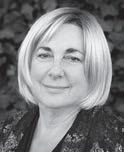

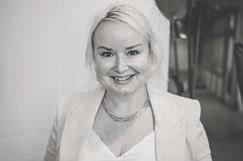
C: 412-760-0412
O: 412-421-9121x225
ELEGANT 2,000 SQ FOOT NORTH OAKLAND PENTHOUSE
Beautiful 4 bedrooms, 3.5 bathrooms at the doorsteps of Pitt, CMU, UPMC Hospitals, and the Carnegie Museums and Lecture Hall.
4601 FIFTH AVE #829 is $375,000, and in a secure building with 24 hour indoor, valet parking.
Stefanie Forscher Behrend, Realtor COMPASS REAL ESTATE


East End Office
Mobile: 412-302-3408
Office: 412-307-7394
stefanie.behrend@compass.com
FOR RENT
THE BEST OF THE IN YOUR EMAIL INBOX














5125FifthAve.
ONCE A WEEK.
2&3Bedrooms Cornerof FifthandWilkins Spacious
1500-2250squarefeet ”FinestinShadyside”
412-661-4456
www.kaminrealty.kamin.com

Dithridge House
First time o ered! 2 bedroom 2 bathonthe 11thfloorwith a greatview and a closedin balcony Building has many amenities. Guest room, party room, pool exercise area and muchmore.
721 53rd Street
A stunning Lawrenceville home o ers 4 levels of luxurious finishes and unparalleled city views. The dazzling hardwood floors and an open-concept layout make living and entertaining easy. The kitchen is a chef’s paradise with stainless steel appliances, Glacier White Quartz countertops, a large island with seating, and crisp white kitchen cabinets elevated with a pop of color from the handmade backsplash tiles and mosaic inlays. Three spacious bedrooms, 3.5 contemporary-styled baths, and thoughtful storage throughout. The top-floor bonus room features French doors to a private balcony with exceptional vistas of downtown and beyond. Enjoy the convenience of dedicated 2-car garage parking equipped with an EV charging outlet. Convenient to public transportation, the Universities, Hospitals, High-Tech corridors, restaurants and shopping. LERTA Tax Abatement.
THE BEST OF THE IN YOUR EMAIL INBOX ONCE A WEEK.

h
206 N. Woodland Road
h
THE BEST OF THE IN YOUR EMAIL INBOX ONCE A WEEK.
Sign up on the right hand side of our homepage. pittsburghjewishchronicle.org

THE BEST OF THE IN YOUR EMAIL INBOX ONCE A WEEK.
h
THE BEST OF THE IN YOUR EMAIL INBOX ONCE A WEEK.
THE BEST OF THE IN YOUR EMAIL INBOX ONCE A WEEK.
North Woodland Road Townhome. Unique custom built sophisticated 4 levels. Lower Level has a great wine cellar, storage, int garage, and a side room which could be an office. First floor has a great room kitchen, dining and living area, plus 1/2 bath. This room leads to an unbelievable courtyard and luscious grounds with a sprinkler system. Next level- large room with a whimsical full bath. Top level has a great master area, with master bath and laundry, Smashing steel and glass staircase, dramatic lighting. Terrific acrhitectural details.
Sign up on the right hand side of our homepage.
Sign up on the right hand side of our homepage.
Sign up on the right hand side of our homepage.
Sign up on the right hand side of our homepage.
pittsburghjewishchronicle.org
pittsburghjewishchronicle.org
pittsburghjewishchronicle.org
pittsburghjewishchronicle.org
Sign up on the right hand side of our homepage.
SHOWCASE YOUR PROPERTIES EVERY WEEK IN THE PITTSBURGH JEWISH CHRONICLE
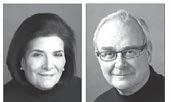
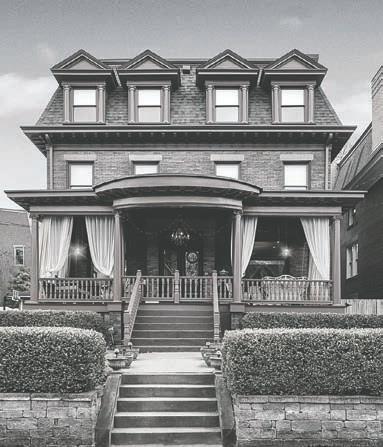
pittsburghjewishchronicle.org
advertising@pittsburghjewishchronicle.org
www.pittsburghjewishchronicle.org

 By Susan Barocas | The Nosher
By Susan Barocas | The Nosher







Matzah pies called minas are a classic Sephardic Passover dish, traditionally served for brunch or lunch with the slow-cooked, hard-boiled eggs called huevos haminados
The truth is that a mina makes a great side or main dish for any meal, even when it’s not Passover. With a top and bottom “crust” made from sheets of matzah, the filling can be made of meat — like seasoned lamb, beef, chicken — or vegetables, most commonly spinach and cheese, though sometimes with leeks or mashed potato added.
Another option is to shred, salt and squeeze about 2 pounds of zucchini to use in place of the spinach in the recipe below. The flavors in this vegetarian mina mimic spinach and feta borekas or spanikopita, but I’ve added a twist. Given the fondness for artichokes in Sephardic food (and for me personally), I’ve added some to the filling for extra texture and flavor.
Ingredients
20 ounces frozen chopped spinach, thawed
5 or 6 sheets plain matzah



2 tablespoons olive oil
1 medium onion, finely chopped
Salt to taste
1 14-ounce can artichoke hearts, drained and diced
1⁄2 cup fresh dill with thinner stems, finely chopped
1 cup (about 4 ounces) crumbled feta
2⁄3 cup grated Parmesan or Romano cheese, divided




1 1⁄2 cups milk (can be low-fat)



1⁄2 teaspoon ground black pepper







1⁄8 teaspoon nutmeg (optional)

3 large eggs, divided
Directions
Preheat oven to 350 F. Put the spinach into a fine mesh strainer and set in the sink or over a bowl to drain.
Fill a large baking pan with tepid water. Break two sheets of matzah in half as equally as possible. Add the matzah to the pan of water for 2 minutes, making sure they are submerged. (You can gently lay a couple heavy pieces of silverware across the top of the matzah to hold down.) The matzah should be pliable, but still hold its shape. Take each sheet out by lifting it holding onto two corners. Let some of the water drip off for a moment, then lay the softened matzah in a single layer on a thick dish towel or two. You can do the matzah in batches depending on the size of your pan with water.
Heat 1 tablespoon olive oil in a large skillet over medium heat. Add the onion and a couple pinches of salt, stir and sauté about 5 minutes until the onion starts to soften. Mix in the chopped artichoke and cook another 10 minutes, stirring occasionally, as the artichokes and onions begin to take on a little color.
As the mixture cooks, use a large spoon or your hands to squeeze as much liquid as possible out of the spinach. Set the squeezed spinach into a large mixing bowl, breaking up the clumps. When the onion and artichokes are ready, add to the bowl with the spinach and stir to blend the vegetables. Add the dill, feta, ⅓ cup grated cheese, milk, pepper and nutmeg, if using. Mix until well blended, then taste for saltiness.
Depending on the saltiness of the feta, add salt as needed. Beat two eggs and stir into the mixture until well blended.
Put 1 tablespoon olive oil in an 8-by-11.5inch (2-quart) glass baking dish. Swirl the oil to cover the bottom and a bit of the sides, then put the dish in the preheated oven for 4 to 5 minutes. Heating the baking dish will help create a good bottom crust and keep it from sticking.
As soon as the dish comes out hot, cover the bottom completely with about 1½ sheets of matzah, slightly overlapping. The matzah should sizzle as it hits the oil. Spoon half the spinach mixture onto the matzah and gently spread evenly. Cover with another layer of 1½ sheets of matzah, then the remaining spinach mixture making sure it’s even. Add the top layer of matzah, covering the filling edge to edge. Use the extra half piece of wet matzah to fill in any of the layers as needed. Beat the remaining egg and tablespoon of oil together. Pour the mixture all over the top of the matzah. Some will drip down the sides and that’s fine. Use a pastry brush to spread any pools of egg so the coating on the matzah is even. Bake for 40 minutes, then sprinkle the remaining ⅓ cup grated cheese evenly over the top. Continue baking another 10 to 12 minutes until the top is golden brown. Let stand 10 minutes before cutting. Serve warm. PJC
Kindergarten through fifth graders enjoyed a youth group Purim Party at Rodef Shalom Congregation.

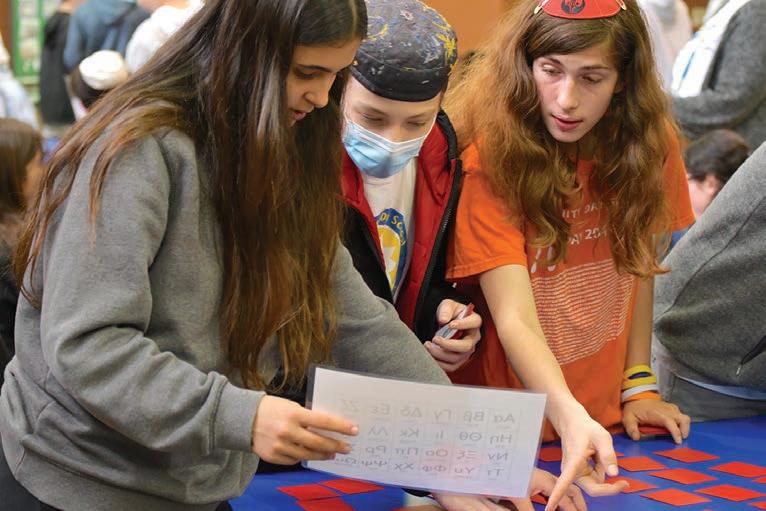

Temple Emanuel of South Hills volunteers partnered with Women’s Center & Shelter to make meals for residents. The dishes were then frozen for later use throughout the week.
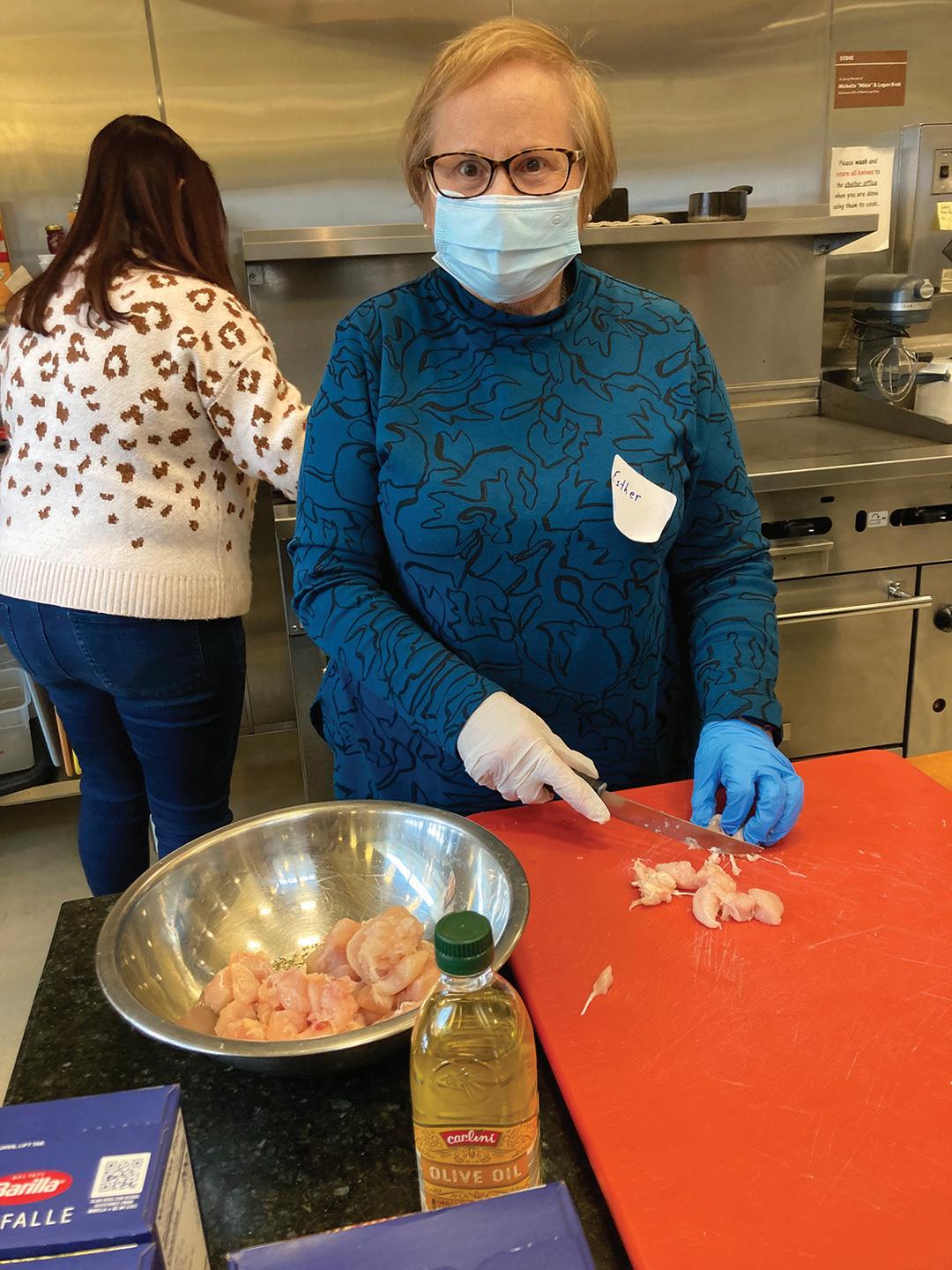

Congregants from Temple David and Crossroads Presbyterian Church engaged in dialogue and taste tests for Passover and Maundy Thursday.
In honor of a number with infinite digits, Community Day School students spent March 14 demonstrating that their love of math is endless.
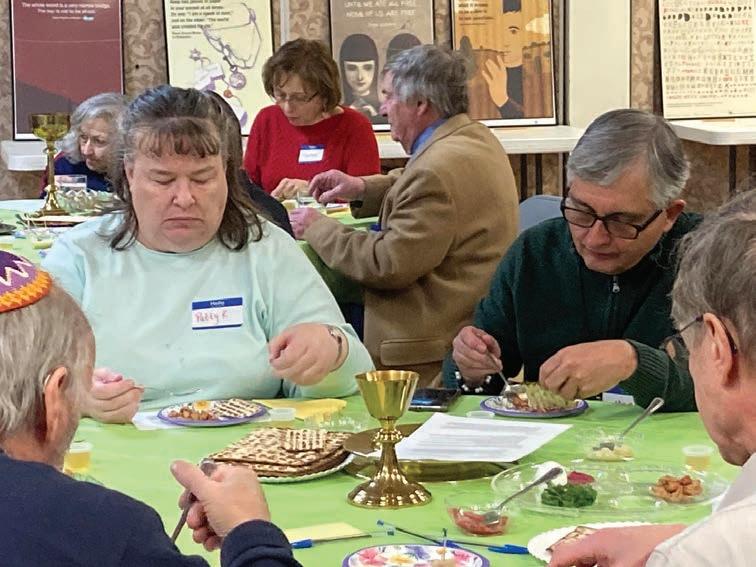
•Variety of deli meats and franks

•All-natural poultry — whole chickens, breasts, wings and more
•All-natural, corn-fed beef — steaks, roasts, ground beef and more
Available at select Giant Eagle stores. Visit GiantEagle.com for location information.
Empire
16 oz. pkg.
save with your Advantage Card
Price effective Thursday, March23 through Wednesday, March29, 2023